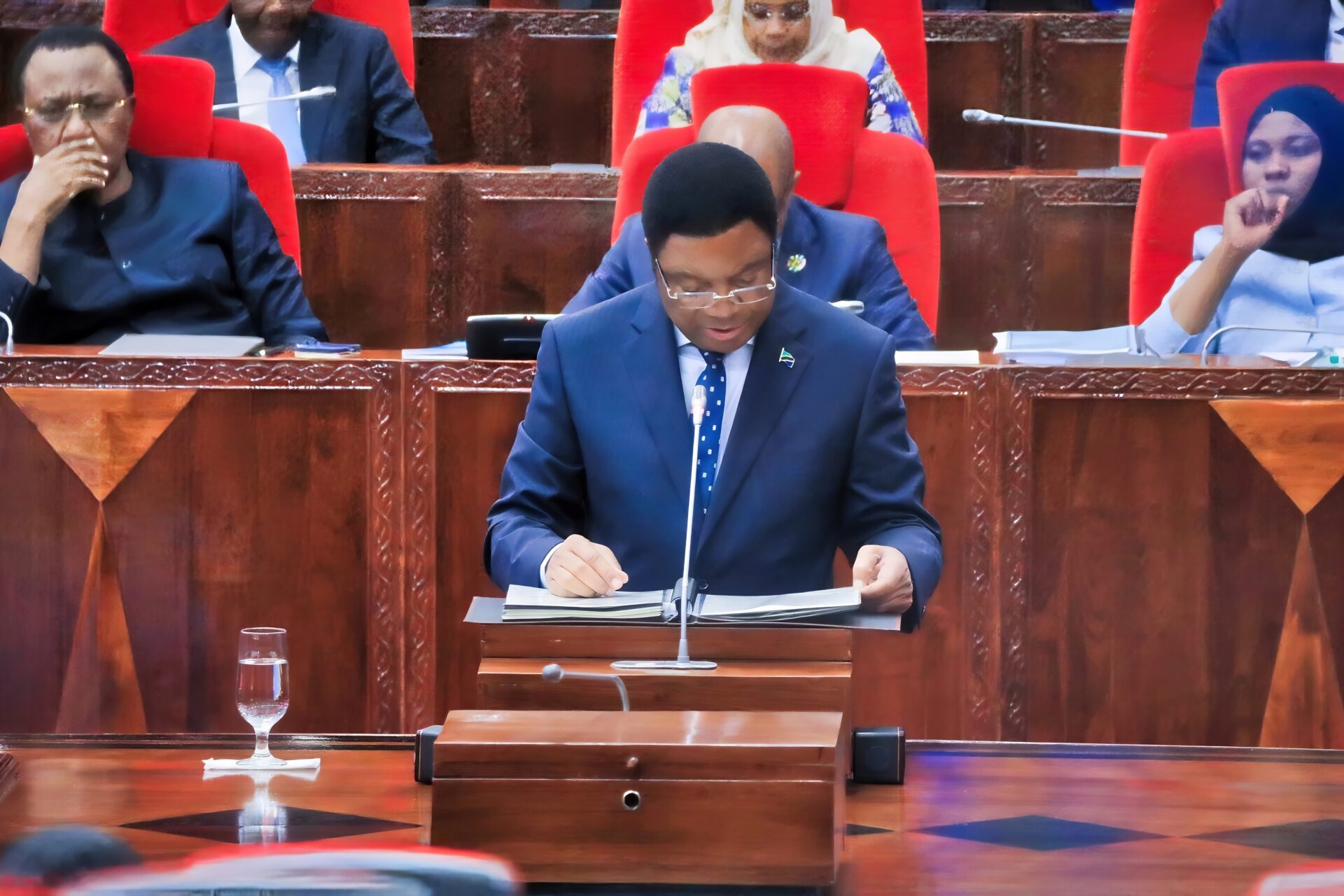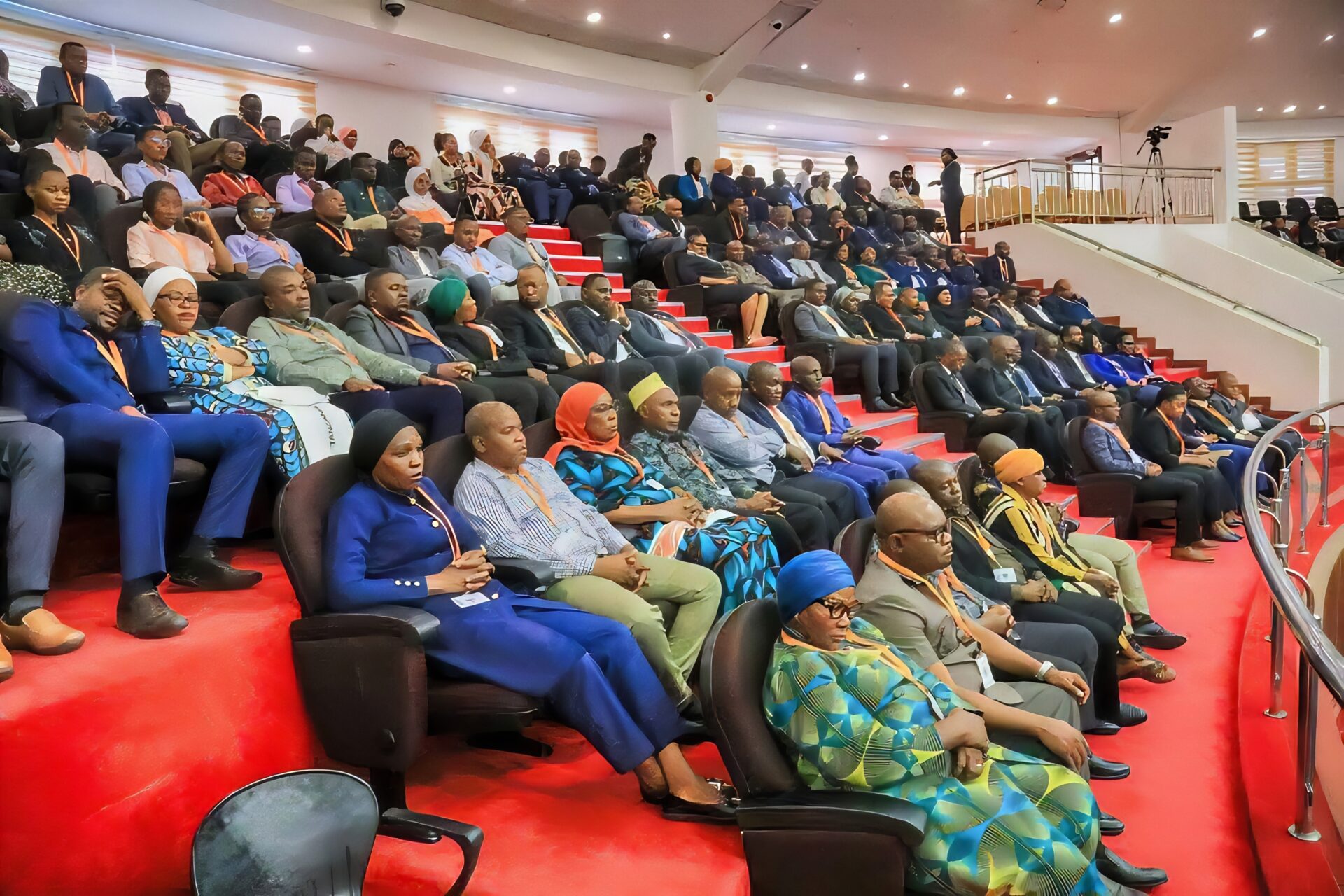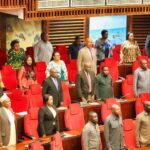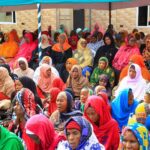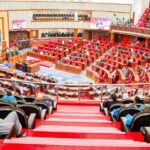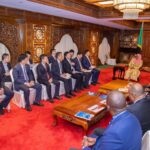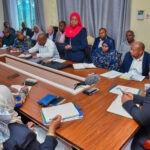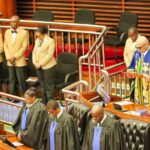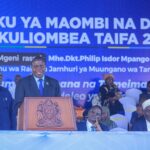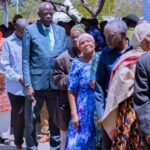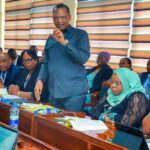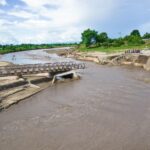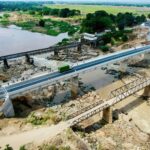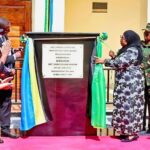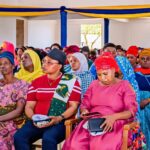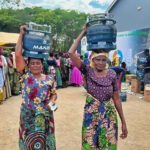Tanzania’s Nineteenth Parliament Session: Progress, Challenges, and Opportunities for Nation-Building
On the morning of 9 April 2025, as the sun rose over the bustling city of Dodoma, the Nineteenth Parliament of Tanzania convened for its second session. This historic gathering marked not only a continuation of legislative business but also a pivotal moment in the nation’s democratic evolution. Under the leadership of Deputy Speaker Hon. Mussa A. Zungu, the session opened with a solemn prayer—a tradition steeped in reverence and unity. For Tanzania and its semi-autonomous region of Zanzibar, this parliamentary session was more than just routine governance; it was a testament to the enduring spirit of democracy, collaboration, and progress that defines these East African nations.
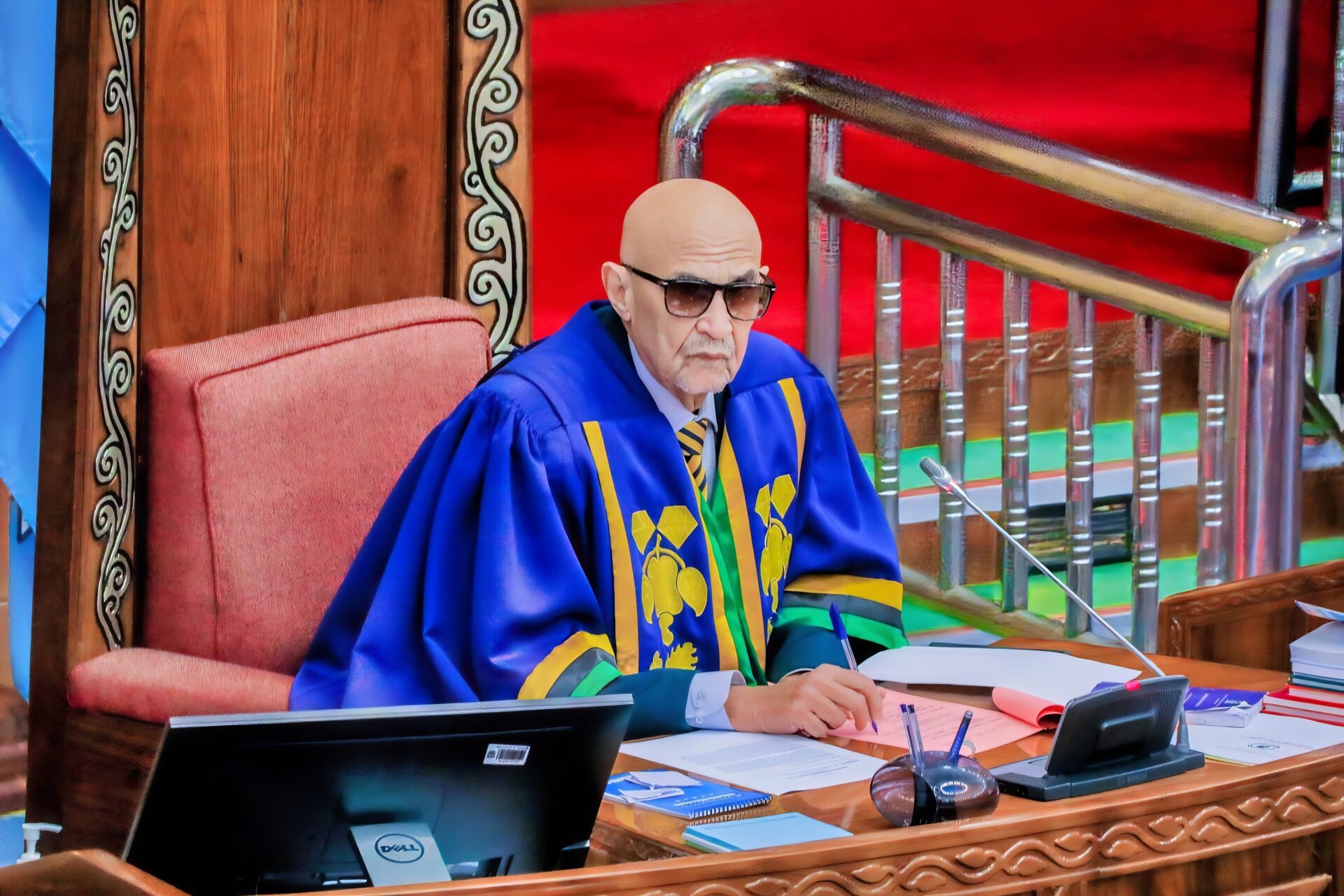
As the chamber filled with esteemed members of parliament, the air buzzed with anticipation. The agenda was ambitious, addressing critical issues such as national budget allocations, socio-economic development, and the strengthening of institutions. But beyond the formal proceedings lay more in-depth questions about the future of Tanzania and Zanzibar: How can governance be made more inclusive? What steps are being taken to bridge regional disparities? And how will the voices of ordinary citizens shape policy decisions? These themes set the stage for an engaging exploration of one of Tanzania’s most significant legislative sessions.
-
Historical Context: Tanzania’s Parliamentary System Since Independence
Tanzania’s parliamentary system, deeply rooted in its post-independence journey, reflects the nation’s commitment to fostering unity, democracy, and socio-economic progress. Since gaining independence in 1961 (as Tanganyika) and later forming the United Republic of Tanzania with Zanzibar in 1964, the country has undergone significant transformations in its legislative framework. These changes have been shaped by key milestones that continue to define its current structure, balancing mainland Tanzania’s aspirations with Zanzibar’s semi-autonomous status.
The Foundations of Post-Independence Governance
Following Tanganyika’s independence from British colonial rule on 9 December 1961, the country adopted a Westminster-style parliamentary system inherited from its colonial past. Julius Nyerere, the first Prime Minister and later President, played a pivotal role in shaping Tanzania’s early governance model. Under his leadership, Tanganyika transitioned to a republic in 1962, marking the beginning of a single-party state dominated by the Tanganyika African National Union (TANU). This move laid the groundwork for centralised governance, which aimed to consolidate national unity amid ethnic diversity.
In 1964, the union between Tanganyika and Zanzibar created the United Republic of Tanzania. This merger introduced a unique dual-government structure: the Union Government overseeing matters of national importance, and the Revolutionary Government of Zanzibar managing local affairs. The establishment of this union required careful negotiation to ensure both regions retained their distinct identities while working towards shared goals. This duality remains a defining feature of Tanzania’s parliamentary system today, with representatives from both mainland Tanzania and Zanzibar participating in the National Assembly.
Key Milestones Shaping the Current Structure
Several critical developments have influenced the evolution of Tanzania’s parliament over the decades:
- The Arusha Declaration (1967): This landmark policy statement by President Nyerere outlined the principles of Ujamaa (African socialism) and self-reliance. It reinforced the centrality of the state in economic planning and social welfare, influencing parliamentary debates and legislation during this era. While controversial, it underscored the importance of using legislative power to drive societal transformation.
- Constitutional Reforms (1977 & 1984): The adoption of a new constitution in 1977 following the merger of TANU and the Afro-Shiraz Party (ASP) into Chama Cha Mapinduzi (CCM) solidified the one-party system. However, growing calls for multiparty democracy led to constitutional amendments in 1984, introducing limited political pluralism and strengthening checks on executive authority.
- Transition to Multiparty Democracy (1992): Responding to internal pressures and global trends, Tanzania embraced multiparty politics through constitutional reforms in 1992. This shift marked a turning point in the history of the National Assembly, as opposition parties gained representation and parliament became a more vibrant arena for debate and accountability.
- Devolution and Semi-Autonomy for Zanzibar: Throughout these changes, the relationship between mainland Tanzania and Zanzibar has remained a focal point. The House of Representatives in Zanzibar operates alongside the National Assembly, addressing issues specific to the islands. This arrangement highlights the delicate balance required to maintain harmony within the union while respecting regional autonomy.
- Strengthening Parliamentary Oversight (2000s-Present): Recent years have seen efforts to enhance the effectiveness of Tanzania’s parliament. Strengthened oversight mechanisms, improved public participation, and increased scrutiny of government spending are among the measures aimed at ensuring transparency and accountability. For example, initiatives like the Public Accounts Committee have gained prominence, reflecting a growing emphasis on good governance.
Challenges and Opportunities
Despite its achievements, Tanzania’s parliamentary system faces ongoing challenges. Critics argue that certain aspects of governance remain overly centralized, limiting the ability of local governments—especially in Zanzibar—to exercise full autonomy. Additionally, there is room to improve public engagement in legislative processes, particularly among marginalized groups such as women and youth.
Nevertheless, opportunities abound. With advancements in technology, Tanzania can leverage digital platforms to foster greater inclusivity and accessibility in parliamentary proceedings. Furthermore, the upcoming Nineteenth Parliament, Second Session, underscores the potential for innovation and reform. By building on its rich historical legacy, Tanzania’s parliament stands poised to address contemporary issues while advancing the ideals of unity, equity, and sustainable development.
In conclusion, Tanzania’s parliamentary system embodies the nation’s resilience and adaptability. From its colonial roots to its present-day configuration, it continues to evolve in response to changing circumstances. As Tanzania and Zanzibar navigate the complexities of modern governance, their shared parliamentary tradition serves as a testament to the enduring spirit of collaboration and progress.
-
Opening Ceremony: A Reverent Start to the Nineteenth Parliament, Second Session
The opening ceremony of the Nineteenth Parliament’s Second Session on 9 April 2025 was a moment steeped in tradition, reverence, and purpose, setting the tone for the legislative business ahead. Held at the Bunge la Tanzania (Parliament of Tanzania) in Dodoma, the session commenced precisely at 9:00 a.m., with an air of solemnity and anticipation filling the chamber. The ceremonial aspects of the session were meticulously crafted to reflect the unity, faith, and democratic ideals that underpin the nation’s governance.
Invocation by Hon. Mussa A. Zungu
The session began with a prayer led by Deputy Speaker Hon. Mussa A. Zungu, a gesture deeply rooted in Tanzanian parliamentary tradition. As he stood before the assembled members, his invocation was not merely a religious act but a unifying moment, symbolising the collective aspirations of the nation. In his prayer, Hon. Zungu called upon divine guidance for wisdom, unity, and strength as parliamentarians embarked on their legislative duties. This invocation is a hallmark of Tanzania’s parliamentary culture, where spiritual reflection is considered integral to fostering harmony and shared purpose among lawmakers.
For many attendees, this moment served as a reminder of the weight of their responsibilities—not just to their political parties or constituencies, but to the people of both mainland Tanzania and Zanzibar. It underscored the importance of integrity, accountability, and collaboration in shaping policies that would impact millions of lives.
The Role of the Deputy Speaker
Following the prayer, Hon. Mussa A. Zungu officially opened the session with a brief address. Addressing the chamber, he welcomed all Members of Parliament, dignitaries, and guests, urging them to approach the session with dedication and commitment. His words carried a sense of gravitas, reminding everyone present of the critical role they play in advancing the nation’s development agenda. He also highlighted the significance of the upcoming discussions, particularly in addressing socio-economic challenges and strengthening the union between mainland Tanzania and Zanzibar.
Hon. Zungu’s leadership during the ceremony exemplified the dignity and impartiality expected of the Deputy Speaker. By maintaining decorum and ensuring adherence to protocol, he set a respectful tone for the proceedings, reinforcing the institutional integrity of the parliament.
Reading of the Agenda
After the invocation, attention turned to the formal reading of the agenda by the Clerk of the National Assembly, Mr. Baraka I. Leonard. The agenda outlined key items up for discussion during the session, including high-priority issues such as the budget presentation for the fiscal year 2025/2026, progress reports on national development projects, and updates on diplomatic engagements.
One notable item on the agenda was the report from the Office of the Prime Minister concerning government performance over the previous year. This segment promised to be particularly engaging, as it would provide insights into the achievements and challenges faced under President Samia Suluhu Hassan’s administration. Additionally, there were provisions for motions and resolutions, allowing MPs to raise specific concerns affecting their constituencies.
The structured nature of the agenda reflected the meticulous planning that goes into each parliamentary session. It ensured that time was allocated efficiently to address pressing national priorities while leaving room for debate and deliberation. For instance, topics like infrastructure development, healthcare reforms, and environmental sustainability were prominently featured, aligning with Tanzania’s long-term vision for inclusive growth and prosperity.
Symbolism and Unity
Beyond its procedural elements, the opening ceremony held symbolic value for Tanzania and Zanzibar. The presence of representatives from both regions underscored the dual character of the United Republic of Tanzania. While debates often highlight differences between the mainland and the islands, ceremonies like these serve as powerful reminders of the shared history and common goals that bind the two entities together.
Moreover, the inclusion of prayers and traditional protocols reflects Tanzania’s unique blend of modernity and cultural heritage. These practices are not mere formalities; they are expressions of identity and continuity, linking contemporary governance to age-old customs.
Guests and Observers
Adding to the solemnity of the occasion were distinguished guests who graced the event. Among them were leaders from various sectors, including education, religion, and civil society, as well as international delegates. Their presence underscored the broader stakeholder interest in Tanzania’s legislative processes. Notably, students from Dar es Salaam Maritime Institute attended as special guests of Deputy Speaker Hon. Zungu, highlighting efforts to engage younger generations in civic matters.
In conclusion, the opening ceremony of the Nineteenth Parliament’s Second Session was more than just a procedural formality—it was a celebration of democracy, unity, and collective resolve. From the heartfelt invocation by Hon. Mussa A. Zungu to the methodical reading of the agenda, every aspect of the ceremony was designed to inspire confidence and foster cooperation among participants.
As the session unfolded, it became clear that the ceremonial beginning was not an end in itself, but rather a prelude to meaningful action. The prayers offered, speeches delivered, and agendas outlined laid the groundwork for what promises to be a transformative period in Tanzania’s legislative journey. With eyes firmly fixed on the future, lawmakers left the ceremony ready to tackle the challenges and opportunities ahead, united in their mission to build a better tomorrow for all Tanzanians and Zanzibaris.
-
Budget Allocations for 2025/2026: A Strategic Focus on Youth Employment, Digital Transformation, and Healthcare
The Nineteenth Parliament’s Second Session, which commenced on 9 April 2025, marked a pivotal moment in Tanzania’s fiscal planning with the unveiling of the proposed budget allocations for the financial year 2025/2026. These allocations reflect the government’s priorities as it seeks to address pressing socio-economic challenges while advancing its long-term development agenda. Among the key focus areas highlighted in the budget are youth employment, digital transformation, and healthcare—sectors that hold immense potential to drive inclusive growth and improve the quality of life for citizens across mainland Tanzania and Zanzibar.
Youth Employment: Empowering the Next Generation
One of the most significant highlights of the 2025/2026 budget is the emphasis on creating opportunities for Tanzania’s burgeoning youth population. With over 60% of the nation’s population under the age of 35, addressing unemployment remains a critical priority. The Ministry of Labour, Youth, Employment, and Persons with Disabilities has been allocated substantial resources to implement programmes aimed at equipping young people with the skills needed for the modern workforce.
- Vocational Training and Skills Development: The budget includes increased funding for vocational training institutions under the Vocational Education and Training Authority (VETA). This investment aims to bridge the gap between education and industry demands by offering hands-on training in sectors such as construction, manufacturing, and information technology. Additionally, partnerships with private sector players are expected to enhance apprenticeship opportunities, ensuring graduates can transition seamlessly into employment.
- Entrepreneurship Support: Recognising entrepreneurship as a viable pathway to self-employment, the ministry plans to expand access to microloans and business incubation services. For instance, the Youth Development Fund (YDF) will receive additional capital to support innovative start-ups, particularly those led by women and marginalised groups.
- Zanzibar-Specific Initiatives: In Zanzibar, where youth unemployment rates have historically been high, special attention is being given to tourism-related enterprises. Programmes promoting small-scale hospitality ventures and cultural tourism initiatives are set to benefit from dedicated funding streams.
These efforts underscore the government’s commitment to fostering an environment where young Tanzanians can thrive economically, thereby reducing poverty and enhancing social stability.
Digital Transformation: Building a Knowledge-Based Economy
Another cornerstone of the 2025/2026 budget is the push towards digital transformation—a move that aligns with global trends and positions Tanzania as a leader in technological innovation within East Africa. Under the leadership of the Office of the Prime Minister, the government has outlined ambitious plans to accelerate the adoption of digital solutions across various sectors.
- Cybersecurity and E-Governance: A notable allocation has been made to strengthen cybersecurity frameworks and protect government data against online threats. This initiative complements ongoing efforts to digitise public services through platforms like TEHAMA , which integrates tax collection, licensing, and other administrative functions. By improving efficiency and transparency, these measures aim to reduce bureaucratic bottlenecks and enhance citizen engagement.
- Infrastructure Development: To facilitate widespread internet access, the budget allocates funds for expanding broadband connectivity, especially in rural areas. Projects such as the laying of fibre-optic cables and the establishment of community Wi-Fi hotspots are expected to democratise access to digital tools, enabling more Tanzanians to participate in the digital economy.
- Education and Innovation Hubs: Investments in STEM (Science, Technology, Engineering, and Mathematics) education and innovation hubs are designed to nurture talent and foster creativity among students. Universities and technical colleges will receive grants to upgrade laboratories and establish research centres focused on emerging technologies like artificial intelligence and renewable energy.
For Zanzibar, this thrust towards digitalisation presents an opportunity to leverage its strategic location as a hub for tech startups and e-commerce platforms serving both local and international markets.
Healthcare: Strengthening Systems for Universal Coverage
Healthcare remains a top priority in the 2025/2026 budget, with significant investments earmarked for improving service delivery and combating public health challenges. The Ministry of Health, Community Development, Gender, Elderly, and Children has outlined several flagship projects aimed at achieving universal health coverage.
- Disease Control and Prevention: A major portion of the budget is dedicated to HIV/AIDS control programmes managed by the Tanzania Commission for AIDS (TACAIDS). Funding increases of approximately 64% for routine operations and 57% for developmental projects signal the government’s resolve to curb the spread of infectious diseases. Furthermore, vaccination campaigns targeting preventable illnesses such as measles and polio are set to receive renewed support.
- Health Infrastructure Upgrades: Addressing longstanding gaps in medical infrastructure, the budget allocates funds for constructing new hospitals and upgrading existing facilities. For example, requests were made during parliamentary debates for completing maternity wards in underserved regions like Geita and Ipogolo. Such projects aim to reduce maternal mortality rates and ensure equitable access to quality care.
- Primary Healthcare Expansion: Efforts to bolster primary healthcare services include hiring additional medical staff, procuring essential medicines, and rolling out telemedicine programmes. These interventions are particularly crucial in rural areas, where access to specialised care remains limited.
In Zanzibar, the Revolutionary Government continues to prioritise malaria eradication and water sanitation initiatives, recognising their impact on overall public health outcomes. Cross-border collaborations with mainland Tanzania further reinforce the shared goal of creating healthier communities.
Balancing Priorities Across Mainland and Zanzibar
While the budget allocations demonstrate a clear alignment with national development goals, they also acknowledge the unique needs of Zanzibar. The semi-autonomous region benefits from targeted funding for projects that promote economic diversification, preserve cultural heritage, and address environmental concerns. For instance, marine conservation programmes in Zanzibar are receiving increased backing as part of broader climate resilience strategies.
However, critics argue that some allocations may not adequately address disparities between urban and rural areas or fully account for inflationary pressures. To mitigate these risks, the government must ensure robust monitoring mechanisms and foster greater collaboration with civil society organisations to track implementation progress.
Conclusion: Charting a Path Forward
The proposed budget allocations for 2025/2026 represent a bold step towards realising Tanzania’s vision of sustainable development. By prioritising youth employment, digital transformation, and healthcare, the government demonstrates its willingness to tackle structural barriers and embrace transformative change. As parliamentarians deliberate on these proposals, their decisions will shape not only the immediate future but also the legacy of progress for generations to come.
Whether in Dodoma or Stone Town, the success of these initiatives hinges on effective execution and sustained commitment. With unity, innovation, and perseverance, Tanzania and Zanzibar stand poised to unlock their full potential, paving the way for a brighter tomorrow.
-
Digital Economy Initiatives: Tanzania’s Push Towards a Digital Future
In recent years, Tanzania has demonstrated a clear commitment to transitioning towards a digital economy, positioning itself as a regional leader in technological innovation within East Africa. This strategic shift is driven by the recognition that embracing digital tools and platforms can unlock unprecedented opportunities for economic growth, governance efficiency, and social inclusion. The Nineteenth Parliament’s Second Session, which commenced on 9 April 2025, underscored this ambition through its emphasis on investments in cybersecurity, e-governance platforms, and broader digital transformation initiatives. These efforts are reshaping how government services are delivered and empowering citizens—both in mainland Tanzania and Zanzibar—to participate more actively in the nation’s development.
A Vision for a Digital Tanzania
At the heart of Tanzania’s digital economy strategy lies the aspiration to create a knowledge-based society where technology serves as a catalyst for progress. President Samia Suluhu Hassan has consistently championed this vision, emphasising the importance of leveraging technology to address socio-economic challenges while fostering sustainable development. Under her leadership, the government has adopted several key policies and frameworks designed to accelerate the adoption of digital solutions across various sectors.
One notable milestone is the launch of the National Assistive Technology Strategy 2024–2027 , which aims to provide an enabling environment for all Tanzanians requiring assistive technologies. By ensuring affordable and timely access to these tools, the strategy seeks to bridge gaps in accessibility, particularly for marginalised groups such as persons with disabilities. This initiative reflects Tanzania’s holistic approach to digital inclusion, prioritising equity alongside innovation.
Strengthening Cybersecurity Frameworks
As digitalisation progresses, safeguarding critical infrastructure and sensitive data becomes paramount. Recognising this, the Tanzanian government has made significant investments in strengthening its cybersecurity capabilities. Through the Office of the Prime Minister (Policy, Parliament, and Administration), efforts have been directed towards enhancing national resilience against cyber threats. Key measures include:
- Development of Robust Security Protocols: The government has introduced advanced protocols to protect public systems from malicious attacks. For instance, the integration of TEHAMA —a comprehensive electronic tax collection system—has required robust security features to ensure seamless operations without compromising taxpayer information.
- Capacity Building: Training programs have been rolled out to equip government officials and IT professionals with the skills needed to manage and mitigate cyber risks effectively. These programs are complemented by partnerships with international organisations and private sector players to stay abreast of emerging trends.
- Public Awareness Campaigns: To foster a culture of vigilance, awareness campaigns targeting businesses and individuals have been launched. These initiatives educate stakeholders about best practices for protecting personal and organisational data online.
These efforts align with global standards and demonstrate Tanzania’s proactive stance in addressing one of the most pressing challenges of the digital age.
Advancing E-Governance Platforms
A cornerstone of Tanzania’s digital economy agenda is the expansion of e-governance platforms, which aim to streamline administrative processes and improve service delivery. The TEHAMA platform stands out as a flagship example, integrating functions such as tax collection, licensing, and permit issuance into a single digital interface. By reducing bureaucratic inefficiencies and enhancing transparency, TEHAMA has already begun transforming interactions between citizens and the state.
Beyond TEHAMA, other notable advancements include:
- Digital Payment Systems: Investments in secure payment gateways have facilitated cashless transactions, benefiting both urban centres and rural areas. For example, farmers in Zanzibar now use mobile money services to receive payments for agricultural produce, thereby increasing financial inclusion.
- Online Registration Services: Business registration processes have been digitised, allowing entrepreneurs to register companies quickly and conveniently. This move supports Tanzania’s goal of fostering a vibrant private sector capable of driving job creation and economic diversification.
- E-Learning and Telemedicine: Educational institutions and healthcare facilities are increasingly adopting digital tools to reach underserved populations. In Zanzibar, telemedicine initiatives have connected remote communities with specialists in Dar es Salaam, improving healthcare outcomes significantly.
Such innovations highlight the transformative potential of e-governance when implemented thoughtfully and inclusively.
Bridging the Digital Divide
While Tanzania’s push towards a digital economy holds immense promise, it also presents challenges that must be addressed to ensure equitable participation. Chief among these is the need to expand internet connectivity, particularly in rural areas where access remains limited. To tackle this issue, the government has allocated resources for projects such as laying fibre-optic cables and establishing community Wi-Fi hotspots. Additionally, subsidies for affordable devices and data packages are being explored to make digital tools accessible to low-income households.
Zanzibar, with its unique island geography, faces distinct challenges related to connectivity. However, targeted interventions—such as undersea cable installations and solar-powered communication towers—are helping overcome these barriers. Furthermore, local content creation initiatives encourage young people in Zanzibar to develop apps and digital products tailored to their cultural context, fostering entrepreneurship and creativity.
Regional and International Collaboration
Tanzania’s journey towards a digital economy is not occurring in isolation. The country actively engages in regional and international collaborations to share knowledge and leverage expertise. Participation in forums such as the East African Community (EAC) and partnerships with global tech giants underscore Tanzania’s willingness to learn from others while contributing to shared goals.
For instance, during the 68th General Conference of the International Atomic Energy Agency (IAEA) held in Vienna, Tanzania showcased its advancements in using digital technologies for energy management. Similarly, at the First International Kiswahili Conference in Havana, Cuba, delegates highlighted how digital platforms could promote Swahili language and culture globally.
Challenges and Opportunities Ahead
Despite impressive strides, Tanzania’s digital economy ambitions face hurdles that require careful navigation. Concerns around data privacy, insufficient funding for large-scale projects, and resistance to change among some segments of the population necessitate ongoing dialogue and adaptation. Nevertheless, the government’s unwavering commitment—evidenced by sustained budgetary allocations and policy reforms—offers hope that these obstacles can be overcome.
Looking ahead, Tanzania’s success will depend on maintaining momentum and fostering collaboration between stakeholders. From upgrading parliamentary broadcasting systems to expanding smart city projects in Dodoma, every step taken reinforces the nation’s resolve to embrace the future boldly.
Tanzania’s push towards a digital economy represents more than just technological advancement—it embodies a broader vision of empowerment, unity, and prosperity. By investing in cybersecurity, e-governance platforms, and inclusive connectivity, the country is laying the groundwork for a brighter tomorrow. As mainland Tanzania and Zanzibar continue to navigate this transformative journey together, they stand poised to inspire other nations striving for meaningful progress in the digital era. With determination and innovation, Tanzania’s dream of becoming a beacon of digital excellence is well within reach.
-
Youth and Employment Policies: Empowering Tanzania’s Youth Through Vocational Training and Entrepreneurship
Tanzania, a nation with over 60% of its population under the age of 35, faces significant challenges in addressing youth unemployment. Recognising this as both an economic and social imperative, the government has introduced a range of initiatives aimed at reducing unemployment among young people. These efforts are particularly focused on vocational training and entrepreneurship programmes, which are designed to equip the youth with practical skills and opportunities for self-employment. The Nineteenth Parliament’s Second Session, convened on 9 April 2025, highlighted these priorities as part of the broader strategy to foster inclusive growth and sustainable development across mainland Tanzania and Zanzibar.
1. Vocational Training Programmes: Bridging the Skills Gap
One of the cornerstones of Tanzania’s youth employment policy is the expansion of vocational training programmes. These initiatives aim to address the mismatch between the skills taught in traditional education systems and the demands of the modern labour market. Key aspects of this approach include:
a) Strengthening Vocational Education and Training Authority (VETA)
The Vocational Education and Training Authority (VETA) has been at the forefront of delivering technical and vocational education tailored to specific industries. Under the current administration, VETA centres have received increased funding to upgrade facilities, introduce new courses, and expand outreach to underserved areas. For instance, Don Bosco Vocational Training Centre in Dar es Salaam has trained 210 young people in automotive mechanics, providing them with hands-on experience that aligns directly with industry needs.
However, challenges remain. While trainees acquire valuable skills, many struggle to secure tools or equipment necessary for self-employment after completing their courses. To address this, the government is urged to establish mechanisms such as microloans or grants specifically targeted at graduates of vocational programmes, enabling them to purchase essential tools and start small businesses.
b) Expanding Access to Rural Areas
In rural regions like Geita and Ipogolo, where access to formal education is limited, mobile vocational training units have been deployed to bring skills closer to communities. This initiative ensures that even those living far from urban centres can benefit from training in trades such as carpentry, masonry, and tailoring. In Zanzibar, similar efforts focus on tourism-related skills, including hospitality management and tour guiding, leveraging the islands’ strategic position as a tourist destination.
2. Entrepreneurship Support: Fostering Innovation and Self-Employment
Beyond vocational training, the government has prioritised entrepreneurship as a viable pathway out of unemployment. By creating an enabling environment for young entrepreneurs, Tanzania aims to cultivate a culture of innovation while tackling joblessness. Key initiatives include:
a) Youth Development Fund (YDF)
The Youth Development Fund (YDF) remains one of the most prominent instruments for supporting young entrepreneurs. This fund provides low-interest loans and grants to startups led by youth, particularly women and marginalised groups. For example, beneficiaries have used YDF capital to launch ventures in sectors such as agriculture, fashion design, and digital services.
To enhance its impact, the government plans to increase the fund’s allocation in the 2025/2026 budget, ensuring it reaches more applicants. Additionally, partnerships with private sector players are being explored to provide mentorship and networking opportunities for grantees.
b) Business Incubation Hubs
Across Tanzania, business incubation hubs have emerged as critical platforms for nurturing young talent. These hubs offer co-working spaces, access to technology, and expert guidance to help budding entrepreneurs refine their ideas into viable enterprises. Notable examples include the Buni Hub in Dar es Salaam and the Zanzibar Tech Park, which support tech-driven innovations ranging from mobile applications to renewable energy solutions.
c) 10% Development Fund for Youth
Another groundbreaking initiative is the 10% Development Fund, established to channel resources towards youth-led projects. Managed by local governments, this fund supports community-based initiatives such as poultry farming, motorcycle taxis (“boda-bodas”), and small-scale retail businesses. According to reports during parliamentary debates, over 42,000 young people benefited from this programme in its initial phase, though challenges persist in scaling it up to meet national targets of reaching 681,000 youth by 2025.
3. Addressing Structural Barriers
While these initiatives hold immense promise, structural barriers must be addressed to maximise their effectiveness. Some key issues include:
a) Limited Funding Allocation
Parliamentary committees have raised concerns about insufficient funding for youth-focused programmes. For instance, the Skills and Development Levy (SDL), intended to finance vocational training, has seen declining disbursements over the past eight years. To rectify this, MPs have called for stricter enforcement of existing agreements between the government and the private sector to ensure funds earmarked for youth development are utilised appropriately.
b) Enhancing Monitoring and Evaluation
Transparency and accountability are crucial to ensuring funds reach the intended beneficiaries. Parliamentary oversight has revealed instances where funds were mismanaged or delayed. As a result, the government is working to implement robust monitoring systems, incorporating digital tools to track expenditures and outcomes.
c) Promoting Gender Equality
Special attention is being given to empowering young women through gender-sensitive policies. For example, entrepreneurship programmes now include components on financial literacy and leadership skills, helping female participants overcome societal biases and access equal opportunities.
4. Regional Focus: Tailoring Initiatives for Zanzibar
Zanzibar’s unique socio-economic context requires tailored approaches to youth employment. The Revolutionary Government of Zanzibar has collaborated closely with the Union Government to implement programmes that align with the islands’ strengths and challenges. Key areas of focus include:
- Marine Resource Management: Training programmes in sustainable fishing and aquaculture aim to create jobs while preserving Zanzibar’s marine ecosystems.
- Cultural Tourism Ventures: Young entrepreneurs are encouraged to develop products and services linked to Zanzibar’s rich cultural heritage, such as guided tours and craft markets.
- Digital Skills Development: With growing internet penetration, initiatives promoting e-commerce and digital marketing enable Zanzibari youth to tap into global markets.
5. Broader Impacts on Society
By investing in youth employment, Tanzania is addressing immediate economic needs and laying the groundwork for long-term stability. Employed youth contribute to household incomes, reduce poverty levels, and foster social cohesion. Moreover, successful entrepreneurs often reinvest in their communities, creating a ripple effect of positive change.
For example, the Mama na Baba Lishe initiative—a nutrition-focused enterprise supported by the 10% Development Fund—has empowered women in rural areas to produce and sell fortified foods. This improves food security and generates income for families.
6. Challenges and Recommendations
Despite progress, several challenges hinder the full realisation of these policies. High dropout rates from vocational programmes, inadequate infrastructure in rural areas, and bureaucratic hurdles in accessing funds are persistent issues. To overcome these obstacles, the following recommendations have been proposed:
- Streamline Fund Disbursement: Simplify application processes for youth funds to reduce delays and improve accessibility.
- Increase Public Awareness: Launch campaigns to inform young people about available opportunities and eligibility criteria.
- Strengthen Public-Private Partnerships: Encourage collaboration between the government and private sector to create apprenticeships and internships.
Tanzania’s commitment to reducing youth unemployment through vocational training and entrepreneurship represents a bold step towards unlocking the potential of its younger generation. From expanding access to vocational education in rural areas to fostering innovation through business incubators, these initiatives reflect a holistic approach to empowerment.
As mainland Tanzania and Zanzibar continue to navigate the complexities of youth employment, sustained investment, effective implementation, and active stakeholder engagement will be vital to achieving lasting success. With determination and collaboration, Tanzania stands poised to transform its youthful demographic dividend into a catalyst for prosperity and progress.
-
Infrastructure Development: Transforming Tanzania and Zanzibar Through Strategic Projects
Infrastructure development has long been a cornerstone of Tanzania’s economic growth strategy, serving as a catalyst for trade, connectivity, and regional integration. The Nineteenth Parliament’s Second Session, which commenced on 9 April 2025, underscored the government’s unwavering commitment to advancing major infrastructure projects. Among these, the Central Railway Line (CRL) and the Kwala Dry Port stand out as transformative initiatives with the potential to revolutionise trade and enhance connectivity across mainland Tanzania and Zanzibar. These projects are not merely engineering feats, but also symbols of progress that align with Tanzania’s vision of becoming a regional hub for commerce and logistics.
1. The Central Railway Line (CRL): A Backbone for Regional Connectivity
The Central Railway Line is one of the most ambitious infrastructure projects in Tanzania’s history. Spanning over 2,561 kilometres, this standard-gauge railway connects key economic hubs, including Dar es Salaam, Morogoro, Dodoma, Tabora, Kigoma, and Mwanza. By linking coastal ports to inland regions and neighbouring countries, the CRL is set to redefine how goods and people move across East Africa.
a) Progress and Milestones
As of February 2025, significant progress has been made on various segments of the CRL:
- Mwanza–Isaka Segment (341 km): Construction is 62.37% complete.
- Makutupora–Tabora Segment (368 km): Progress stands at 14.53%.
- Tabora–Isaka Segment (165 km): Completion rate is 6.33%.
- Tabora–Kigoma Segment (506 km): Work has reached 7.34%.
Additionally, preparations for the Uvinza–Malagarasi–Musongati Segment (282 km) have begun, following the signing of an agreement between Tanzania and Burundi on 29 January 2025. This segment will further strengthen cross-border connectivity, particularly benefiting landlocked nations like Burundi and the Democratic Republic of Congo (DRC).
b) Economic and Social Impact
The CRL promises profound benefits for Tanzania and its neighbours:
- Reduced Travel Time: Since its partial launch on 1 August 2024, the Dar es Salaam–Morogoro–Dodoma route has reduced travel time from 10 hours by road to just 3–4 hours by train. This efficiency has already facilitated the movement of 1,809,983 passengers and generated revenue of TZS 54.9 billion by February 2025.
- Boost to Trade: By providing a reliable and cost-effective mode of transport, the CRL enhances access to international markets. For instance, goods from the DRC and Zambia can now reach Dar es Salaam’s port faster, reducing reliance on congested road networks.
- Job Creation: The project has created thousands of jobs, both temporary and permanent, contributing to local economies along the railway corridor.
For Zanzibar, improved connectivity through the CRL indirectly supports tourism and export-oriented industries by streamlining supply chains and lowering transportation costs.
2. The Kwala Dry Port: Enhancing Logistics Efficiency
Another flagship project highlighted during the parliamentary session is the Kwala Dry Port, located near Dodoma. Designed to complement Tanzania’s maritime ports, the dry port aims to decentralise cargo handling operations and alleviate congestion at traditional terminals like Dar es Salaam.
a) Strategic Importance
The Kwala Dry Port is strategically positioned to serve as a gateway for central and western Tanzania, as well as neighbouring countries such as Rwanda, Burundi, and the DRC. Its proximity to Dodoma—the political capital—makes it a vital node for domestic and regional trade.
b) Potential Benefits
- Decongestion of Ports: By shifting container activities inland, the dry port reduces pressure on Dar es Salaam’s overloaded facilities, thereby improving overall logistics efficiency.
- Cost Savings: Businesses benefit from reduced freight costs and shorter transit times, making Tanzanian exports more competitive globally.
- Industrial Growth: The establishment of special economic zones around the dry port is expected to attract foreign direct investment (FDI), fostering industrialisation and job creation.
In Zanzibar, the dry port indirectly supports the islands’ economy by ensuring smoother import-export processes for goods destined for or originating from the archipelago.
3. Complementary Infrastructure Initiatives
Beyond the CRL and Kwala Dry Port, several other infrastructure projects are underway to bolster Tanzania’s trade and connectivity:
a) Bridges and Road Networks
- Tanzanite Bridge (Dar es Salaam): Spanning 1.03 kilometres, this iconic bridge has significantly eased traffic congestion in the city while promoting urban development.
- Kigongo–Busisi Bridge (Mwanza): At 98% completion, this 3.2-kilometre bridge will connect Lake Victoria’s shores, facilitating agricultural exports and tourism.
- Road Expansion Programme: In the fiscal year 2024/2025 alone, Tanzania constructed 246 kilometres of bitumen roads and maintained 3,107.38 kilometres of rural roads. These efforts ensure all-weather accessibility to remote areas, fostering inclusive growth.
b) Air Transport and Aviation
The modernisation of Air Tanzania Company Limited (ATCL) reflects the government’s focus on enhancing air connectivity. With the acquisition of six passenger aircraft and one cargo plane since November 2020, ATCL now operates a fleet of 16 planes. New routes to Johannesburg, Guangzhou, Mumbai, Lubumbashi, Lusaka, Ndola, Harare, Dubai, Nairobi, Entebbe, Bujumbura, Moroni, and soon Kinshasa demonstrate Tanzania’s ambition to position itself as a regional aviation leader.
Zanzibar, with its burgeoning tourism sector, directly benefits from these expanded flight options, attracting more visitors and boosting local businesses.
4. Broader Implications for Trade and Regional Integration
The cumulative impact of these infrastructure projects extends beyond national borders. Tanzania’s strategic location within the East African Community (EAC) positions it as a critical player in regional trade dynamics. Key developments include:
- East African Crude Oil Pipeline (EACOP): Stretching 1,443 kilometres from Hoima (Uganda) to Tanga (Tanzania), this pipeline is 55% complete and will facilitate the export of Ugandan crude oil. It has already generated 6,610 temporary jobs and 114 permanent positions.
- Cross-Border Collaboration: Projects like the Uvinza–Malagarasi–Musongati railway segment exemplify Tanzania’s commitment to fostering cooperation with neighbouring states, reinforcing its role as a logistical gateway for the region.
For Zanzibar, enhanced regional integration translates into greater market access for its spices, seafood, and handicrafts, thereby diversifying its economy beyond tourism.
5. Challenges and Recommendations
While these projects hold immense promise, challenges must be addressed to maximise their impact:
- Funding Constraints: Delays in securing adequate financing could hinder timely completion. Public-private partnerships (PPPs) and innovative funding models should be explored.
- Environmental Concerns: Large-scale projects often face criticism for their ecological footprint. Sustainable practices must be prioritised to mitigate adverse effects.
- Community Engagement: Ensuring local communities benefit from infrastructure projects requires transparent communication and equitable resource distribution.
Tanzania’s infrastructure development agenda, epitomised by the Central Railway Line and the Kwala Dry Port, represents a bold step towards unlocking the nation’s full potential. By enhancing trade, connectivity, and regional collaboration, these projects lay the foundation for sustainable economic growth and social transformation.
For mainland Tanzania, improved infrastructure fosters industrialisation and poverty reduction, while for Zanzibar, it opens new avenues for economic diversification and global engagement. As the nation continues to build bridges—both literal and metaphorical—it solidifies its position as a beacon of progress in East Africa. With determination and innovation, Tanzania and Zanzibar are poised to reap the rewards of these transformative investments for generations to come.
-
Healthcare Reforms: Advancing Public Health Systems in Tanzania and Zanzibar
The healthcare landscape in Tanzania and Zanzibar has undergone significant reforms in recent years, driven by a commitment to enhance public health systems and address pressing challenges such as HIV/AIDS control, vaccination campaigns, and broader healthcare accessibility. These efforts, highlighted during the Nineteenth Parliament’s Second Session on 9 April 2025, reflect a strategic vision to improve health outcomes, strengthen governance, and ensure equitable access to quality care for all citizens. Through targeted initiatives, innovative policies, and increased funding, Tanzania is making strides toward achieving universal health coverage while addressing region-specific needs, particularly in Zanzibar.
1. Strengthening HIV/AIDS Control Measures
One of the most notable achievements in Tanzania’s healthcare reforms is the progress made in controlling HIV/AIDS. Under the leadership of the Tanzania Commission for AIDS (TACAIDS), the government has implemented robust strategies aimed at curbing new infections, improving treatment adherence, and mitigating the socio-economic impact of the disease.
a) Enhancing Prevention Programmes
Prevention remains a cornerstone of Tanzania’s HIV/AIDS response. The government has prioritised education campaigns to raise awareness about transmission risks and promote safe practices. For example:
- Community-Based Testing: Mobile clinics have been deployed to underserved areas, enabling early detection and linkage to care.
- Targeted Interventions: Special focus has been placed on high-risk groups, including adolescents, sex workers, and fishermen in regions like Shinyanga and Singida, where infection rates remain elevated.
b) Scaling Up Treatment Access
The availability of antiretroviral therapy (ART) has improved significantly, with over 89.3% of required drugs and medical supplies now accessible, compared to just 47% in 2020. This increase has benefited Tanzanians and attracted medical tourists seeking affordable treatment abroad. By February 2025, approximately 7,843 patients from neighbouring countries had received treatment, up from 5,705 in 2020—an indicator of growing confidence in Tanzania’s healthcare system.
c) Sustainability Initiatives
To reduce dependency on external donors, Tanzania has introduced mechanisms such as the AIDS Trust Fund (ATF) , which allocates funds internally for critical interventions:
- 60% for Prevention: Funds are directed towards community-based prevention programmes and education campaigns.
- 30% for Governance: Ensuring efficient management of resources through quarterly reviews and capacity-building workshops.
- 10% for Mitigation: Supporting economic empowerment initiatives for people living with HIV/AIDS.
These measures underscore Tanzania’s resolve to achieve long-term sustainability in its HIV/AIDS response.
2. Expanding Vaccination Campaigns
Vaccination campaigns have played a pivotal role in safeguarding public health, particularly against preventable diseases such as measles, polio, and tetanus. Recent successes include:
a) Routine Immunisation Coverage
Efforts to expand routine immunisation have yielded positive results, with coverage rates improving steadily across mainland Tanzania and Zanzibar. For instance:
- In rural districts, mobile vaccination teams have reached remote communities, ensuring no child is left behind.
- Partnerships with international organisations, such as Gavi, the Vaccine Alliance, have facilitated the procurement of vaccines at subsidised costs.
b) Addressing Emerging Threats
In response to global health threats, Tanzania has launched targeted vaccination drives. During parliamentary debates, it was noted that vaccination campaigns against emerging diseases like cholera and meningitis have been intensified, especially in flood-prone areas and refugee camps.
c) Strengthening Cold Chain Systems
To maintain vaccine efficacy, investments have been made in cold chain infrastructure, including solar-powered refrigerators and temperature-monitoring devices. These innovations are particularly impactful in Zanzibar, where island geography poses logistical challenges.
3. Improving Maternal and Child Health Services
Maternal and child health remains a priority area, with significant investments aimed at reducing maternal mortality rates and improving neonatal care. Key initiatives include:
a) Antenatal and Postnatal Care
Antenatal clinics have been upgraded to provide comprehensive services, including ultrasound scans, nutrition counselling, and family planning advice. In Zanzibar, special attention has been given to integrating traditional birth attendants into formal healthcare networks, ensuring culturally sensitive care.
b) Safe Delivery Practices
The construction of maternity wards in underserved regions—such as Geita and Ipogolo—has enhanced access to safe delivery services. Additionally, training programmes for midwives and obstetricians have bolstered workforce capacity.
4. Leveraging Digital Platforms for Efficiency
The introduction of the TEHAMA platform exemplifies Tanzania’s embrace of technology to streamline healthcare delivery. This digital system facilitates:
- Data Collection and Analysis: Real-time tracking of patient records and resource utilisation enables evidence-based decision-making.
- Accountability Mechanisms: Transparent reporting ensures compliance with national standards.
- Telemedicine Services: Remote consultations have bridged gaps in specialist care, particularly in rural and island settings.
As of February 2025, over 4,813 public health facilities—representing 67% of primary healthcare units—were using TEHAMA, benefiting well over 6 million patients annually.
5. Regional Collaboration Between Mainland and Zanzibar
The relationship between mainland Tanzania and Zanzibar continues to shape healthcare reforms, fostering shared learning and resource optimisation. Joint committees meet regularly to evaluate union-related issues, including:
- Resource Allocation: Ensuring equitable distribution of funds and supplies.
- Policy Harmonisation: Aligning regulations to avoid duplication or inconsistency.
- Cross-Border Referrals: Facilitating seamless transfers for patients requiring specialised treatment unavailable locally.
For example, Zanzibar’s success in malaria eradication serves as a model for mainland Tanzania, demonstrating how targeted interventions can yield transformative results.
6. Challenges and Recommendations
Despite commendable progress, several challenges persist:
- Funding Constraints: While budget allocations for TACAIDS increased by 64% for 2025/2026, sustaining this momentum requires continued fiscal discipline.
- Workforce Shortages: Many rural clinics still face shortages of qualified personnel, necessitating recruitment drives and incentives for remote postings.
- Infrastructure Gaps: Hospital expansions and equipment upgrades are urgently needed to accommodate growing demand.
To address these issues, stakeholders recommend:
- Public-Private Partnerships: Engaging private sector players to supplement government efforts.
- Decentralised Planning: Empowering local governments to tailor interventions based on regional priorities.
- Community Engagement: Encouraging grassroots participation to foster ownership and accountability.
7. Broader Implications for Society
Healthcare reforms in Tanzania and Zanzibar extend beyond individual well-being; they contribute to broader socio-economic development. Improved health outcomes lead to higher productivity, reduced poverty levels, and enhanced educational attainment. Moreover, successful public health initiatives reinforce trust in government institutions, strengthening social cohesion.
For instance, the integration of livestock healthcare services—a key economic driver—into the national health agenda highlights the interconnectedness of human, animal, and environmental health. Investments in veterinary vaccines and disease surveillance systems have protected livelihoods while promoting food security.
Tanzania’s healthcare reforms represent a bold step toward building resilient and inclusive public health systems. From combating HIV/AIDS to expanding vaccination coverage and embracing digital innovation, these efforts demonstrate the nation’s determination to overcome longstanding barriers and seize new opportunities.
As mainland Tanzania and Zanzibar continue to collaborate and innovate, they stand poised to transform their healthcare landscapes into models of excellence. With sustained commitment and collaborative action, Tanzania and Zanzibar can pave the way for healthier, more prosperous futures—not just for themselves but for the entire East African region.
-
Education Sector Priorities: Enhancing Access to Quality Education in Tanzania and Zanzibar
The education sector remains a cornerstone of Tanzania’s development agenda, with the government demonstrating an unwavering commitment to improving access, quality, and equity across all levels—from primary schools to universities. The Nineteenth Parliament’s Second Session, convened on 9 April 2025, highlighted several ambitious initiatives aimed at addressing longstanding challenges such as teacher shortages, inadequate infrastructure, and disparities in educational outcomes between urban and rural areas. These efforts are informed by Tanzania’s broader vision of fostering human capital development that aligns with national socio-economic goals while ensuring inclusivity for both mainland Tanzania and Zanzibar.
1. Expanding Access to Primary and Secondary Education
Access to quality education begins at the foundational level, and Tanzania has made significant strides in this regard. However, challenges persist, particularly in underserved regions. To address these gaps, the government has outlined key priorities:
a) Infrastructure Development
- Construction of New Schools: In the fiscal year 2024/2025, TZS 24.92 billion was allocated for constructing new classrooms, completing unfinished projects initiated through community efforts, and rehabilitating dilapidated structures in primary and secondary schools.
- Expansion of Facilities: Special attention is being given to upgrading existing institutions to meet higher academic standards. For example, Shule ya Sekondari Busagara and Shule ya Sekondari Kumgogo have begun admitting students into Form Five (Year 13), marking a step toward universalising post-secondary education.
b) Addressing Regional Disparities
In Zanzibar, where island geography often complicates service delivery, targeted investments are being made to ensure equitable access. Projects like the construction of maternity wards in schools—such as those requested in Geita and Ipogolo—are designed to create safe learning environments for girls, thereby reducing dropout rates.
2. Strengthening Teacher Capacity and Recruitment
Teacher shortages remain one of the most pressing issues affecting the quality of education. To tackle this challenge, the government has introduced several measures:
a) Professional Development
- Training Programmes: Continuous professional development programmes are being rolled out nationwide to equip teachers with modern pedagogical skills. This includes training in digital tools and innovative teaching methodologies.
- Recruitment Drives: Efforts are underway to recruit more qualified educators, particularly in rural areas where attrition rates are highest. For instance, under the Samia Scholarship Program , scholarships are being awarded to aspiring teachers pursuing degrees in education.
b) Retention Strategies
To retain experienced staff, incentives such as housing allowances, performance-based bonuses, and improved working conditions are being implemented. These strategies aim to reduce turnover and enhance job satisfaction among educators.
3. Promoting STEM Education and Vocational Training
Recognising the importance of science, technology, engineering, and mathematics (STEM) in driving innovation, the government has prioritised STEM education and vocational training:
a) Girls’ Science Schools Initiative
One notable project is the establishment of Girls’ Science Schools in all 26 regions of mainland Tanzania. As of February 2025, TZS 121.55 billion had been invested in building these institutions, which focus on nurturing scientific talent among young women. So far, 10,274 students have enrolled, reflecting growing interest in STEM fields.
b) Vocational Training Expansion
Through the Vocational Education and Training Authority (VETA) , vocational training centres are being upgraded to offer courses aligned with market demands. Don Bosco Vocational Training Centre in Dar es Salaam serves as a model, having trained 210 youths in automotive mechanics alone. Similar initiatives are underway in Zanzibar, focusing on tourism-related skills such as hospitality management.
4. Bridging the Gap in Higher Education
Higher education plays a critical role in producing skilled professionals who can contribute to Tanzania’s growth. Key interventions include:
a) Scholarships and Financial Aid
The Samia Scholarship Program , launched during President Samia Suluhu Hassan’s administration, supports high-achieving students pursuing degrees in STEM, medicine, and other priority fields. Since its inception, TZS 6.63 billion has been disbursed, benefiting 1,313 students.
b) University Infrastructure
Investments are also being directed toward expanding university facilities. Plans are in place to construct additional campuses for institutions like VETA and the Open University of Tanzania, ensuring wider geographic coverage.
5. Addressing Challenges in Implementation
Despite commendable progress, several challenges must be addressed to achieve sustainable impact:
a) Funding Constraints
While significant funds have been earmarked for education, parliamentary debates have raised concerns about delays in releasing allocations. Transparent financial management systems are needed to ensure timely disbursement and accountability.
b) Curriculum Relevance
There is a call to review curricula regularly to ensure they remain relevant to current labour market needs. Emphasis should be placed on integrating practical skills and entrepreneurship modules into syllabi.
c) Equity Issues
Although enrolment rates have improved, disparities still exist between urban and rural learners. Tailored policies are required to support disadvantaged groups, including children with disabilities and those from low-income households.
6. Zanzibar-Specific Initiatives
Zanzibar faces unique challenges due to its semi-autonomous status and reliance on tourism. The Revolutionary Government of Zanzibar, in collaboration with the Union Government, has adopted specific strategies to bolster education:
- Marine Resource Management Courses: Vocational programmes focusing on sustainable fishing and aquaculture aim to empower youth with skills suited to Zanzibar’s economy.
- Cultural Tourism Training: Entrepreneurial ventures linked to cultural heritage are being promoted, enabling young people to capitalise on Zanzibar’s rich traditions.
Additionally, joint committees oversee union-related matters, ensuring harmonised policies benefit both mainland Tanzania and Zanzibar equally.
7. Broader Implications for Society
Enhancing access to quality education has far-reaching benefits beyond individual achievement. Educated citizens contribute to economic productivity, social stability, and civic engagement. Moreover, successful educational reforms reinforce public trust in government institutions, fostering a sense of shared purpose.
For example, the integration of assistive technologies into classrooms—under the National Assistive Technology Strategy 2024–2027 —ensures inclusivity for persons with disabilities, promoting equality and diversity.
Tanzania’s education sector priorities represent a bold step toward creating an inclusive, high-quality system capable of meeting contemporary challenges. From expanding access to primary and secondary education to strengthening teacher capacity and promoting STEM fields, these initiatives underscore the nation’s determination to invest in its future leaders.
As mainland Tanzania and Zanzibar continue to collaborate and innovate, they stand poised to transform their educational landscapes into models of excellence. With sustained commitment and collaborative action, Tanzania and Zanzibar can pave the way for brighter, more prosperous futures—not just for themselves but for the entire East African region.
-
Environmental Sustainability: Addressing Climate Change, Land Management, and Sustainable Agriculture in Tanzania and Zanzibar
Environmental sustainability has emerged as a critical priority for Tanzania and Zanzibar, reflecting the global urgency to address climate change while fostering resilient ecosystems and economies. The Nineteenth Parliament’s Second Session, convened on 9 April 2025, underscored the government’s commitment to implementing policies targeting climate change mitigation, land management reforms, and sustainable agricultural practices. These initiatives are designed not only to protect natural resources but also to ensure that Tanzania and Zanzibar remain vibrant, habitable, and economically viable for future generations.
1. Climate Change Mitigation Policies
Climate change poses significant risks to Tanzania and Zanzibar, including rising sea levels, erratic rainfall patterns, and increased frequency of extreme weather events. To mitigate these challenges, the government has introduced comprehensive strategies:
a) National Climate Action Plans
Tanzania has aligned its climate policies with international frameworks such as the Paris Agreement. Key measures include:
- Renewable Energy Investments: Expanding solar, wind, and hydroelectric power projects to reduce reliance on fossil fuels. For instance, the construction of renewable energy plants in rural areas supports off-grid electrification.
- Afforestation and Reforestation: Programs to plant millions of trees annually aim to restore degraded forests and enhance carbon sequestration. Community-led tree-planting drives have gained momentum, particularly in regions like Morogoro and Kilimanjaro.
b) Coastal Zone Management
Zanzibar, with its extensive coastline, faces unique vulnerabilities due to climate change. To safeguard marine ecosystems and coastal communities, the Revolutionary Government of Zanzibar has implemented:
- Mangrove Restoration Projects: Protecting mangroves helps buffer against storm surges and provides habitat for marine life.
- Coral Reef Conservation: Initiatives to preserve coral reefs promote biodiversity and sustain fisheries-dependent livelihoods.
c) Public Awareness Campaigns
Educational campaigns targeting schools, farmers, and local governments highlight the importance of adopting eco-friendly practices. During parliamentary debates, MPs emphasised the need for grassroots engagement to foster a culture of environmental stewardship.
2. Land Management Reforms
Effective land management is essential for balancing development with conservation. Recent reforms in Tanzania aim to streamline land use, prevent degradation, and resolve conflicts over resource ownership.
a) Strengthening Legal Frameworks
The Programme for Planning, Measuring, and Securing Land seeks to formalise land tenure systems, ensuring equitable access and reducing disputes. By digitising land records through platforms like TEHAMA, transparency and efficiency in land administration have improved significantly.
b) Combatting Land Degradation
In response to widespread soil erosion and desertification, the government has launched rehabilitation programs:
- Soil Conservation Techniques: Farmers are trained in terracing, contour ploughing, and agroforestry to minimise soil loss.
- Reclamation of Degraded Lands: Projects in semi-arid regions focus on restoring productivity through irrigation and organic farming methods.
c) Urban Land Use Planning
Rapid urbanisation in cities like Dar es Salaam necessitates sustainable planning. The government is investing in green spaces, waste management systems, and flood control infrastructure to create livable environments.
3. Sustainable Agricultural Practices
Agriculture remains the backbone of Tanzania’s economy, employing approximately 65% of the population. To ensure long-term food security and environmental health, the government promotes sustainable farming techniques:
a) Adoption of Climate-Smart Agriculture
Farmers are encouraged to adopt practices that increase resilience to climate variability:
- Drought-Resistant Crops: Distribution of seeds for maize, sorghum, and millet varieties adapted to dry conditions supports smallholder farmers.
- Water Harvesting Systems: Building dams and reservoirs enables rainwater collection for irrigation during dry spells.
b) Organic Farming and Agroecology
Organic farming reduces chemical inputs, preserving soil fertility and water quality. In Zanzibar, spice farmers have embraced organic certification, gaining access to premium international markets.
c) Integrated Pest Management (IPM)
Rather than relying on pesticides, IPM combines biological controls, crop rotation, and resistant varieties to manage pests sustainably. This approach minimises environmental harm while maintaining yields.
4. Regional Collaboration Between Mainland and Zanzibar
The relationship between mainland Tanzania and Zanzibar plays a pivotal role in advancing environmental sustainability. Joint efforts include:
- Shared Research Initiatives: Collaborative studies on coastal erosion and coral bleaching provide valuable data for policy formulation.
- Cross-Border Conservation Areas: Transboundary parks, such as those along the Tanzania-Mozambique border, protect migratory wildlife corridors.
During the Joint Committee Meetings on Union Matters , representatives from both entities reviewed progress on shared environmental goals, reinforcing their commitment to mutual prosperity.
5. Broader Implications for Society
Sustainable environmental policies yield far-reaching benefits beyond ecological preservation:
- Economic Growth: Green industries create jobs and stimulate innovation. For example, eco-tourism ventures in Serengeti National Park attract visitors while funding conservation efforts.
- Social Equity: Ensuring fair access to natural resources reduces poverty and fosters social cohesion.
- Health Improvements: Cleaner air and water contribute to better public health outcomes.
For instance, the integration of livestock healthcare services into national agricultural strategies demonstrates how human, animal, and environmental health intersect. Investments in veterinary vaccines and disease surveillance systems protect livelihoods while promoting food security.
6. Challenges and Recommendations
Despite commendable progress, several obstacles must be addressed:
- Funding Constraints: Limited financial resources hinder large-scale implementation of sustainability projects. Innovative financing mechanisms, such as green bonds, should be explored.
- Capacity Building: Training programmes for extension workers and farmers are crucial to disseminate knowledge effectively.
- Policy Harmonisation: Aligning regulations across sectors ensures coherence and avoids duplication.
To overcome these challenges, stakeholders recommend:
- Public-Private Partnerships (PPPs): Engaging private sector players can supplement government efforts.
- Decentralised Planning: Empowering local governments to tailor interventions based on regional priorities.
- Community Engagement: Encouraging grassroots participation fosters ownership and accountability.
Tanzania and Zanzibar’s environmental sustainability agenda represents a bold step toward building resilient and inclusive societies. From mitigating climate change to reforming land management and promoting sustainable agriculture, these initiatives demonstrate the nation’s determination to balance economic growth with ecological integrity.
As mainland Tanzania and Zanzibar continue to collaborate and innovate, they stand poised to transform their landscapes into models of excellence. With sustained commitment and collaborative action, Tanzania and Zanzibar can pave the way for healthier, more prosperous futures—not just for themselves but for the entire East African region.
Through visionary leadership and collective effort, the dream of a sustainable tomorrow becomes an achievable reality.
-
Strengthening Regional Integration: Tanzania’s Role in Fostering Cooperation within the East African Community (EAC) and Beyond
Tanzania has long been a cornerstone of regional integration efforts in East Africa, leveraging its strategic geographic position, rich natural resources, and diplomatic acumen to foster collaboration within the East African Community (EAC) and beyond. The Nineteenth Parliament’s Second Session, convened on 9 April 2025, highlighted Tanzania’s pivotal role in advancing regional cooperation through trade, infrastructure development, diplomacy, and shared governance frameworks. These initiatives underscore Tanzania’s commitment to transforming the EAC into a thriving economic bloc while strengthening ties with neighbouring regions and global partners.
1. Leadership within the East African Community (EAC)
Tanzania’s leadership within the EAC is evident in its proactive participation in high-level decision-making forums and its willingness to champion transformative projects that benefit member states.
a) Diplomatic Representation and Policy Influence
In February 2025, Tanzania was elected as the representative for the EAC on the African Union (AU) Executive Council during the 38th Ordinary Session of the Assembly of Heads of State and Government held in Addis Ababa, Ethiopia. This appointment underscores Tanzania’s credibility and influence in shaping regional policies at both continental and sub-regional levels. As the EAC representative, Tanzania will advocate for equitable resource distribution, conflict resolution mechanisms, and sustainable development strategies across the continent.
Additionally, Tanzania’s hosting of key summits—such as the 24th Summit of EAC Heads of State in Arusha—has provided an opportunity to address pressing issues like peace building in the eastern Democratic Republic of Congo (DRC). By facilitating dialogue among stakeholders, Tanzania reinforces its reputation as a mediator and unifier within the region.
b) Infrastructure Development for Regional Connectivity
Infrastructure remains a critical enabler of regional integration, and Tanzania has spearheaded several cross-border projects aimed at enhancing connectivity and trade. One flagship initiative is the East African Crude Oil Pipeline (EACOP) , which spans 1,443 kilometres from Hoima in Uganda to Tanga in Tanzania. With construction reaching 55% completion by February 2025, this project is expected to create over 6,610 temporary jobs and 114 permanent positions, benefiting both Tanzanian and Ugandan communities. Moreover, it strengthens energy security and fosters industrialisation across the EAC.
Other notable projects include:
- Central Railway Line (CRL): Connecting Dar es Salaam to landlocked countries such as Rwanda, Burundi, and the DRC, the CRL facilitates seamless movement of goods and people.
- Kwala Dry Port: Designed to decongest Dar es Salaam’s port, the dry port enhances logistics efficiency, particularly for imports and exports destined for inland markets.
These infrastructural advancements not only bolster intra-regional trade but also position Tanzania as a logistical hub for Southern and Central Africa.
2. Expanding Trade and Economic Partnerships
Trade liberalisation and economic partnerships are central to Tanzania’s vision of regional integration. Through the EAC Customs Union and Common Market Protocols, Tanzania promotes tariff-free trade and free movement of labour, capital, and services.
a) Boosting Intra-EAC Trade
Tanzania actively supports measures to increase intra-EAC trade, which currently accounts for less than 20% of total trade volumes among member states. Initiatives such as harmonising standards, reducing non-tariff barriers, and promoting value-added exports aim to unlock untapped potential. For instance, Tanzania’s agricultural sector supplies maize, rice, and horticultural products to regional markets, contributing to food security and rural livelihoods.
b) Engaging Beyond the EAC
While prioritising EAC integration, Tanzania also engages with other regional blocs to diversify its economic partnerships. As a member of the Southern African Development Community (SADC), Tanzania plays a dual role in bridging the gap between Eastern and Southern Africa. During the 44th SADC Summit in Harare, Zimbabwe, in August 2024, President Samia Suluhu Hassan was appointed Chairperson of the SADC Organ on Politics, Defence, and Security for one year. This mandate enables Tanzania to address transnational challenges such as terrorism, organised crime, and climate-induced displacement.
Furthermore, Tanzania participates in tripartite negotiations involving the EAC, SADC, and COMESA (Common Market for Eastern and Southern Africa) to establish a larger free trade area spanning 26 countries. Such efforts align with Tanzania’s goal of becoming a gateway for international commerce.
3. Promoting Cultural and Social Cohesion
Beyond economics, Tanzania champions cultural exchange and social cohesion as pillars of regional integration. The country’s emphasis on preserving the Swahili language and traditions resonates deeply within the EAC and beyond.
a) Swahili as a Lingua Franca
The inaugural International Kiswahili Conference held in Havana, Cuba, in July 2024 exemplifies Tanzania’s dedication to promoting Swahili globally. With approximately 400 participants from various nations, the conference sought to elevate Swahili as a medium for Afrocentric discourse and diplomacy. By advocating for Swahili’s inclusion in educational curricula and media platforms, Tanzania fosters a sense of unity among EAC citizens who share this linguistic heritage.
b) Sports and Youth Engagement
Sports diplomacy is another avenue through which Tanzania strengthens regional bonds. Hosting the 2027 Africa Cup of Nations (AFCON) provides an opportunity to showcase Tanzania’s hospitality and infrastructure while fostering camaraderie among Africans. Similarly, participation in events like the CHAN (African Nations Championship) tournament scheduled for August 2025 attracts fans from across the continent, creating avenues for cultural interaction.
4. Addressing Shared Challenges
Regional integration requires addressing common challenges that transcend national borders. Tanzania collaborates closely with EAC partners to tackle issues such as climate change, health pandemics, and refugee management.
a) Climate Change Mitigation
Through joint initiatives like the Lake Victoria Basin Commission, Tanzania works with Kenya, Uganda, Rwanda, and Burundi to combat environmental degradation around Africa’s largest freshwater lake. Efforts include reforestation, water conservation, and sustainable fishing practices.
b) Health Security
The COVID-19 pandemic underscored the importance of coordinated health responses. Tanzania has since partnered with EAC member states to strengthen disease surveillance systems and vaccine distribution networks. For example, the Tanzania Commission for AIDS (TACAIDS) collaborates with regional bodies to curb HIV/AIDS transmission rates, sharing best practices and resources.
c) Refugee Management
As host to thousands of refugees from Burundi, the DRC, and South Sudan, Tanzania advocates for durable solutions through the EAC framework. Joint programmes focus on education, skills training, and repatriation, ensuring displaced populations contribute positively to host communities.
5. Balancing National and Regional Interests
While championing regional integration, Tanzania must balance national interests with collective goals. Zanzibar’s semi-autonomous status adds complexity to this dynamic, requiring careful negotiation to ensure equitable representation and benefits.
a) Fiscal Arrangements
Under the Loans, Guarantees, and Grants Act (Cap. 134), fiscal arrangements between mainland Tanzania and Zanzibar are governed by clear guidelines. For instance, loans secured by the Union Government for regional projects are allocated based on a 95.5% (mainland) and 4.5% (Zanzibar) ratio. Regular joint committee meetings review the implementation of agreements, ensuring transparency and accountability.
b) Sectoral Collaboration
Collaboration extends to sectors like tourism, where Zanzibar’s unique attractions complement mainland Tanzania’s wildlife safaris. Joint marketing campaigns under the “Amazing Tanzania” brand attract international visitors, boosting revenue streams for both entities.
6. Broader Implications for Society
Regional integration yields significant socio-economic dividends for Tanzania and its neighbours:
- Job Creation: Cross-border investments generate employment opportunities, particularly in manufacturing, agriculture, and services.
- Poverty Reduction: Enhanced market access empowers small-scale traders and entrepreneurs to expand their businesses.
- Technological Transfer: Partnerships with developed nations facilitate knowledge exchange and innovation adoption.
For example, the deployment of renewable energy technologies—such as solar panels and wind turbines—across the EAC reflects Tanzania’s commitment to sustainable development. These innovations improve living standards while mitigating environmental risks.
7. Challenges and Recommendations
Despite commendable progress, several hurdles remain:
- Implementation Gaps: Delays in executing agreed-upon projects hinder momentum. Streamlined coordination mechanisms are needed to fast-track implementation.
- Funding Constraints: Limited financial resources necessitate innovative financing models, including public-private partnerships and concessional loans.
- Political Will: Sustained commitment from all member states is crucial to overcoming protectionist tendencies and fostering trust.
To address these challenges, stakeholders recommend:
- Enhanced Monitoring Systems: Establishing robust monitoring frameworks ensures timely delivery of projects and accountability.
- Capacity Building: Training government officials and private sector actors equips them with skills to navigate complex regional dynamics.
- Community Engagement: Encouraging grassroots participation fosters ownership and minimises resistance to change.
Tanzania’s role in fostering regional integration within the EAC and beyond exemplifies its vision of a united, prosperous East Africa. From leading diplomatic missions to implementing transformative infrastructure projects, Tanzania demonstrates unwavering dedication to collaborative progress.
As mainland Tanzania and Zanzibar continue to navigate the complexities of regional cooperation, they stand poised to reap substantial rewards—not just for themselves, but for the entire EAC. With sustained commitment and innovative approaches, Tanzania can solidify its position as a beacon of hope and prosperity in the region. Through unity, resilience, and shared purpose, the dream of a fully integrated East Africa becomes increasingly attainable.
-
Zanzibar’s Unique Position: Navigating the Relationship Between Mainland Tanzania and Zanzibar
The relationship between mainland Tanzania and Zanzibar is a cornerstone of the United Republic of Tanzania, embodying a delicate yet enduring balance of unity and autonomy. As a semi-autonomous region, Zanzibar enjoys a distinct identity within the union, with its government, legislative assembly, and administrative structures. This unique position allows Zanzibar to address its specific needs while contributing to the broader goals of the union. The Nineteenth Parliament’s Second Session, convened on 9 April 2025, highlighted ongoing efforts to strengthen this relationship, particularly in addressing union matters and promoting shared prosperity for both entities.
1. Historical Context of the Union
The union between Tanganyika (mainland Tanzania) and Zanzibar was formalised on 26 April 1964, following the Zanzibar Revolution and subsequent negotiations led by Julius Nyerere and Abeid Amani Karume. This historic merger created the United Republic of Tanzania, blending two culturally and geographically distinct regions into a single political entity. While the union has endured for nearly six decades, it remains a dynamic and evolving partnership that requires continuous dialogue and cooperation.
In February 2025, Tanzania commemorated the loss of Bibi Sifael Mushi, one of the key figures who participated in the unification process. Her legacy underscores the importance of unity while respecting the unique contributions of both mainland Tanzania and Zanzibar.
2. Addressing Union Matters Through Joint Committees
To ensure the smooth functioning of the union, regular joint committee meetings are held between representatives of the Revolutionary Government of Zanzibar and the Union Government. These committees play a critical role in reviewing and implementing decisions related to shared responsibilities, such as foreign affairs, defence, and economic policy.
a) Evaluating Progress
During the fiscal year 2024/2025, two joint committee meetings were conducted to assess the implementation of previous agreements. These evaluations focus on areas such as fiscal allocations, infrastructure development, and social service delivery. For instance:
- Fiscal Allocations: Under the Loans, Guarantees, and Grants Act (Cap. 134), Zanzibar receives 4.5% of loans and grants secured by the Union Government, while mainland Tanzania retains 95.5%. This ratio reflects an effort to balance resource distribution equitably.
- Infrastructure Projects: Joint initiatives, such as the construction of maternity wards in underserved regions like Geita and Ipogolo, aim to address disparities across the union.
b) Resolving Challenges
Despite these mechanisms, challenges persist. During parliamentary debates, MPs raised concerns about delays in releasing funds allocated to Zanzibar. To address this, stakeholders have called for greater transparency and streamlined disbursement processes.
3. Promoting Shared Prosperity
A core objective of the union is to foster shared prosperity by leveraging the strengths of both mainland Tanzania and Zanzibar. This involves collaborative efforts in trade, tourism, agriculture, and other sectors that contribute to economic growth.
a) Tourism Development
Tourism is a vital sector for both regions, but Zanzibar’s reliance on international visitors necessitates tailored strategies. Initiatives include:
- Cultural Tourism: Zanzibar promotes its rich heritage through guided tours of Stone Town, spice farms, and traditional markets. These ventures complement mainland Tanzania’s wildlife safaris, creating a diverse portfolio of attractions under the “Amazing Tanzania” brand.
- Joint Marketing Campaigns: Collaborative campaigns highlight the interconnectedness of mainland and island experiences, encouraging tourists to explore both destinations.
b) Agricultural Innovation
Zanzibar’s agricultural sector benefits from union-wide programmes focused on sustainable practices. For example:
- Spice Farming: Farmers in Zanzibar have adopted organic certification schemes, gaining access to premium global markets.
- Livestock Management: Cross-border exchange of expertise enhances livestock productivity, benefiting both regions.
c) Infrastructure Integration
Major infrastructure projects, such as the Central Railway Line (CRL) and the Kwala Dry Port, facilitate seamless connectivity between mainland Tanzania and Zanzibar. These developments reduce transportation costs and improve market access for goods produced in Zanzibar.
4. Strengthening Economic Ties
Economic integration is central to achieving shared prosperity. Through strategic investments and policy alignment, the union aims to create a cohesive and competitive economy.
a) Fiscal Contributions
Zanzibar contributes significantly to the union’s revenue base through sectors such as tourism, fishing, and maritime trade. In turn, the Union Government channels resources into development projects that benefit both regions. For instance:
- TASAF III Programme: The Social Action Fund supports poverty reduction initiatives in rural areas, including those in Zanzibar.
- Climate Adaptation Projects: Initiatives addressing sea-level rise and coastal erosion safeguard Zanzibar’s ecosystems while aligning with national climate goals.
b) Diaspora Engagement
Efforts to engage Tanzanians abroad also extend to Zanzibar. By tapping into diaspora networks, the union seeks to attract remittances, investments, and skills transfer that bolster local economies.
5. Diplomatic Representation and International Cooperation
On the global stage, Tanzania and Zanzibar present a united front, leveraging their collective influence to advance mutual interests. President Samia Suluhu Hassan’s leadership exemplifies this approach, earning recognition as a leading diplomat in Africa.
a) Regional Leadership
Tanzania’s election as the representative for the East African Community (EAC) on the African Union (AU) Executive Council in February 2025 reflects its commitment to regional integration. Similarly, Zanzibar’s participation in forums such as the Southern African Development Community (SADC) strengthens ties with neighbouring states.
b) Bilateral Agreements
Bilateral agreements, such as the Permanent Joint Commission of Cooperation between Tanzania and Comoros, underscore the importance of fostering strong relationships with island nations. These partnerships promote trade, cultural exchange, and environmental conservation.
6. Balancing Autonomy and Unity
While Zanzibar enjoys significant autonomy, maintaining harmony within the union requires careful navigation of sensitive issues. Key considerations include:
- Resource Sharing: Ensuring fair distribution of resources remains a priority, particularly in sectors like energy and water management.
- Cultural Preservation: Respecting Zanzibar’s unique traditions while promoting national cohesion fosters a sense of belonging among all citizens.
7. Broader Implications for Society
The success of the union has far-reaching implications for Tanzania’s socio-economic landscape:
- Job Creation: Collaborative projects generate employment opportunities, particularly in infrastructure and tourism.
- Poverty Reduction: Targeted interventions address inequality, improving living standards for marginalized groups.
- Social Cohesion: Celebrating diversity while emphasizing shared values reinforces national unity.
For example, the integration of Kiswahili language promotion—highlighted during the First International Kiswahili Conference in Havana, Cuba—demonstrates how cultural diplomacy can unite Tanzanians and Zanzibaris alike.
Zanzibar’s unique position within the United Republic of Tanzania exemplifies the potential of unity amidst diversity. By addressing union matters through joint committees, promoting shared prosperity, and balancing autonomy with collaboration, Tanzania and Zanzibar continue to build a resilient and inclusive nation.
As mainland Tanzania and Zanzibar navigate the complexities of their relationship, they stand poised to achieve remarkable progress—not just for themselves, but for the entire East African region. With sustained commitment and innovative approaches, the dream of a prosperous and harmonious union becomes increasingly attainable. Through unity, resilience, and shared purpose, Tanzania and Zanzibar pave the way for a brighter future.
-
Cultural Preservation: Promoting Swahili Language and Culture in Tanzania and Zanzibar
The promotion of the Swahili language and culture stands as a cornerstone of Tanzania’s national identity, fostering unity, pride, and global recognition. Both mainland Tanzania and Zanzibar have embraced initiatives to preserve and elevate their rich cultural heritage, ensuring that Swahili remains not only a national treasure but also a globally respected language. These efforts are particularly evident in preparations for World Kiswahili Day celebrations, which underscore Tanzania’s commitment to showcasing its linguistic and cultural legacy on an international stage.
1. National Initiatives to Elevate Swahili
Swahili, or Kiswahili , is more than just a language; it is a unifying force that binds Tanzanians across ethnic and regional divides. Recognising its importance, the government has launched several programmes aimed at promoting Swahili both locally and internationally.
a) Establishment of Cultural Centres Abroad
Under the leadership of President Samia Suluhu Hassan, Tanzania has taken significant steps to establish cultural centres in embassies abroad. These centres serve as hubs for teaching Swahili to foreigners, thereby expanding its reach and influence. For instance:
- Embassy-Based Language Training: Tanzanian embassies now offer Swahili courses tailored to diplomats, students, and expatriates interested in learning the language.
- Cultural Exchange Programmes: Collaborations with foreign institutions promote mutual understanding through art, music, and traditional performances rooted in Swahili culture.
b) Integration into Global Education Systems
Tanzania’s efforts extend to integrating Swahili into university curricula worldwide:
- Partnerships with Universities: Agreements have been signed with institutions in countries such as China, India, and Germany to introduce Swahili as a subject of study. This initiative aligns with Tanzania’s vision of positioning Swahili as a bridge connecting Africa to the rest of the world.
- Publication of Educational Materials: The production of textbooks, dictionaries, and multimedia resources ensures that learners have access to high-quality materials.
2. International Recognition: The First International Kiswahili Conference
A landmark event in Tanzania’s cultural diplomacy was the First International Kiswahili Conference , held in Havana, Cuba, in July 2024. This conference brought together approximately 400 participants from various nations, highlighting the universal appeal of Swahili.
a) Objectives of the Conference
The primary goal of the conference was to propagate Swahili among populations of African descent and beyond. Key themes included:
- Language Preservation: Discussions focused on strategies to safeguard endangered dialects while modernising Swahili for contemporary use.
- Cultural Diplomacy: By sharing Swahili literature, poetry, and folklore, delegates celebrated the richness of East African traditions.
b) Outcomes and Impact
The conference resulted in tangible outcomes, such as:
- Global Partnerships: Countries like Brazil and Jamaica expressed interest in incorporating Swahili into their educational frameworks.
- Media Collaboration: Plans were announced to produce films and documentaries featuring Swahili narratives, further amplifying its global presence.
This milestone reinforced Tanzania’s role as a custodian of Swahili culture, inspiring renewed enthusiasm among citizens to embrace their linguistic heritage.
3. Celebrating World Kiswahili Day
World Kiswahili Day, observed annually on 7 July, is a testament to Tanzania’s dedication to preserving and promoting Swahili. Preparations for this celebration involve nationwide activities designed to engage communities and foster a sense of ownership over the language.
a) Community Engagement
Local governments organise events such as poetry recitals, storytelling sessions, and traditional dance performances. Schools play a pivotal role by hosting competitions where students showcase their proficiency in Swahili through essays, debates, and theatrical productions.
b) Media Campaigns
Radio and television stations broadcast special programming dedicated to Swahili culture. For example:
- Documentaries: Features on historical figures who contributed to the development of Swahili highlight the language’s evolution.
- Talk Shows: Experts discuss the socio-economic benefits of promoting Swahili as a tool for regional integration within the East African Community (EAC).
4. Zanzibar’s Unique Contribution
Zanzibar, with its deep-rooted connection to Swahili culture, plays a vital role in these preservation efforts. As a melting pot of African, Arab, Indian, and European influences, Zanzibar offers a unique perspective on the diversity of Swahili traditions.
a) Stone Town: A Living Museum
Stone Town, a UNESCO World Heritage Site, serves as a living museum of Swahili architecture, cuisine, and craftsmanship. Guided tours introduce visitors to the island’s storied past, emphasising the interplay between language and culture.
b) Spice Trade Legacy
The spice trade, which once thrived in Zanzibar, continues to shape its cultural narrative. Farmers proudly share stories about how Swahili facilitated commerce during the colonial era, underscoring its enduring relevance.
5. Strengthening National Identity Through Utamaduni Wetu
The slogan “Utamaduni Wetu ni Utu Wetu; Tuuenzi na Kuuendeleza” (“Our Culture is Our Dignity; Let Us Build and Develop It”) encapsulates Tanzania’s philosophy of cultural preservation. This ethos was prominently featured during the Third National Cultural Festival held in Ruvuma Region.
a) Objectives of the Festival
The festival aimed to:
- Celebrate Diversity: Performances showcased the varied customs and artistic expressions found across Tanzania’s regions.
- Empower Youth: Workshops encouraged young people to take pride in their heritage and contribute to its preservation.
b) Tangible Outcomes
Participants left the festival with a renewed appreciation for Tanzania’s intangible cultural heritage, including oral traditions, rituals, and crafts. Artisans received training on marketing their products internationally, creating sustainable livelihoods while preserving age-old techniques.
6. Challenges and Recommendations
Despite commendable progress, challenges persist in promoting Swahili and preserving cultural heritage:
- Resource Constraints: Limited funding hampers large-scale campaigns and infrastructure projects.
- Urbanisation Pressures: Rapid urban growth threatens traditional ways of life, necessitating policies that balance modernisation with conservation.
- Globalisation Threats: Western cultural influences risk overshadowing indigenous practices.
To address these issues, stakeholders recommend:
- Increased Investment: Allocating more resources to cultural ministries and grassroots organisations.
- Digital Platforms: Leveraging technology to archive and disseminate cultural content.
- Youth Involvement: Engaging younger generations through interactive media and social networks.
7. Broader Implications for Society
Promoting Swahili and preserving cultural heritage yield profound benefits for Tanzania and Zanzibar:
- Social Cohesion: A shared language fosters unity amidst diversity, reducing ethnic tensions.
- Economic Opportunities: Cultural tourism attracts international visitors, generating revenue and creating jobs.
- Global Influence: As Swahili gains prominence, Tanzania solidifies its position as a leader in African diplomacy and soft power.
For example, the “Amazing Tanzania” branding campaign leverages Swahili phrases and imagery to market the country’s natural wonders and vibrant culture. Similarly, initiatives like the Royal Tour film series spotlight Tanzania’s beauty while celebrating its linguistic heritage.
Tanzania’s dedication to promoting the Swahili language and preserving its cultural heritage reflects a deep-seated commitment to national pride and global engagement. From establishing cultural centres abroad to hosting international conferences, these initiatives demonstrate Tanzania’s resolve to share its treasures with the world.
As mainland Tanzania and Zanzibar continue to collaborate and innovate, they stand poised to inspire future generations to cherish and uphold their cultural legacy. With sustained effort and visionary leadership, Tanzania can ensure that Swahili remains a beacon of unity, resilience, and excellence—not just for itself but for humanity at large. Through cultural preservation, the dream of a harmonious and interconnected world becomes increasingly attainable.
-
Sports and National Unity: Fostering Pride Through Sports Facilities and International Events
Sports have long been recognised as a powerful tool for fostering national unity, promoting social cohesion, and instilling a sense of pride among citizens. In Tanzania and Zanzibar, the construction of modern sports facilities and the hosting of international events such as the Africa Cup of Nations (AFCON) 2027 are being leveraged not only to elevate the nation’s sporting profile but also to strengthen its identity and unity. These initiatives, highlighted during the Nineteenth Parliament’s Second Session on 9 April 2025, reflect Tanzania’s strategic vision of using sports as a unifying force while showcasing its cultural and infrastructural potential to the world.
1. Construction of Sports Facilities
The development of state-of-the-art sports infrastructure is a cornerstone of Tanzania’s efforts to enhance its sporting ecosystem and foster national pride. These projects are designed to create accessible, world-class venues that inspire athletes and engage communities.
a) Preparations for AFCON 2027
Tanzania’s successful bid to host the AFCON 2027 tournament has catalysed significant investments in sports infrastructure. Key developments include:
- Stadiums in Arusha and Dodoma: The government is constructing new stadiums in these cities to meet international standards. These venues will serve as hubs for football matches and other sporting events, ensuring Tanzania can accommodate large audiences and global broadcasts.
- Upgrades to Existing Facilities: Renovations are underway at iconic stadiums like the Benjamin Mkapa National Stadium in Dar es Salaam and Amaan Stadium in Zanzibar. Improvements focus on enhancing seating capacity, lighting systems, and accessibility features.
b) Community-Centric Design
Beyond elite competitions, these facilities are being designed with local communities in mind:
- Multi-Purpose Arenas: Many stadiums incorporate spaces for recreational activities, youth training programmes, and cultural events, making them integral to daily life.
- Grassroots Engagement: Schools and local clubs are encouraged to use these facilities, fostering talent identification and nurturing future champions.
The construction process itself generates employment opportunities, particularly for young people, further contributing to socio-economic development.
2. Hosting International Events
Hosting international sporting events provides Tanzania with a platform to celebrate its diversity, showcase its progress, and unite its people under a shared sense of achievement.
a) AFCON 2027: A Celebration of Football and Unity
The upcoming AFCON 2027 tournament represents more than just a football competition; it symbolises Tanzania’s emergence as a regional leader in sports diplomacy. Key benefits include:
- National Pride: Tanzanians across the mainland and Zanzibar will rally behind their national team, the Taifa Stars , fostering a collective spirit of support and enthusiasm.
- Global Exposure: The event will attract thousands of visitors, including fans, media personnel, and investors, offering an opportunity to highlight Tanzania’s rich culture, tourism attractions, and investment prospects.
- Legacy Impact: Post-tournament, the improved infrastructure will continue to benefit local communities, hosting domestic leagues, concerts, and community gatherings.
b) CHAN 2025: Showcasing Local Talent
In addition to AFCON, Tanzania is preparing to host the CHAN (African Nations Championship) tournament in August 2025. This event focuses exclusively on players competing in their home leagues, providing a unique platform to celebrate grassroots football talent. It reinforces Tanzania’s commitment to developing its domestic league system and empowering homegrown athletes.
3. Strengthening National Identity
Sports transcend ethnic, linguistic, and regional divides, making them an ideal vehicle for promoting national identity and unity. Tanzania’s approach integrates sports into broader cultural and educational frameworks:
a) Promoting Swahili Culture
Through initiatives like the First International Kiswahili Conference held in Havana, Cuba, Tanzania has positioned Swahili as a unifying language both locally and globally. Similarly, sports events often incorporate elements of Swahili culture—such as traditional music, dance, and attire—creating a vibrant tapestry of national heritage.
b) Youth Empowerment
Engaging young people in sports fosters discipline, teamwork, and leadership skills. Programmes like the Goli la Mama initiative, championed by President Samia Suluhu Hassan, aim to nurture young athletes while promoting gender equality in sports. By investing in female participation, Tanzania sets an example for inclusivity and empowerment.
4. Regional Collaboration Between Mainland and Zanzibar
Zanzibar plays a vital role in Tanzania’s sports strategy, leveraging its unique strengths to complement mainland initiatives. Joint efforts include:
- Shared Infrastructure: Facilities in Zanzibar, such as the upgraded Amaan Stadium, contribute to the overall readiness for international events.
- Cultural Exchange: Sporting tournaments provide opportunities for mainlanders and Zanzibaris to interact, celebrate shared traditions, and deepen mutual understanding.
During parliamentary debates, MPs emphasised the importance of equitable resource allocation between mainland Tanzania and Zanzibar to ensure both regions benefit from sports-related investments.
5. Economic and Social Benefits
Investments in sports infrastructure and hosting international events yield significant economic and social dividends:
- Job Creation: From construction workers to hospitality staff, these projects generate thousands of jobs, boosting household incomes.
- Tourism Growth: Sporting events attract tourists who explore Tanzania’s natural wonders, historical sites, and cultural landmarks, driving revenue for local businesses.
- Health and Wellbeing: Accessible sports facilities encourage physical activity, reducing lifestyle-related illnesses and improving public health outcomes.
For instance, the “Amazing Tanzania” branding campaign highlights sports alongside wildlife safaris and cultural tours, positioning Tanzania as a diverse destination for global visitors.
6. Challenges and Recommendations
While the potential benefits are immense, challenges must be addressed to maximise impact:
- Funding Constraints: Large-scale projects require substantial financial resources. Innovative financing models, such as public-private partnerships, should be explored.
- Sustainability Planning: Ensuring long-term utilisation of facilities post-event is crucial to avoid white elephants. Community involvement in facility management can help sustain operations.
- Capacity Building: Training coaches, referees, and administrators ensures Tanzania maintains high standards in sports governance.
To overcome these hurdles, stakeholders recommend:
- Transparent Oversight: Establishing robust monitoring mechanisms to track project implementation and expenditure.
- Community Ownership: Encouraging grassroots participation in decision-making processes to build trust and accountability.
- Diversified Programming: Offering a range of activities beyond football to cater to varied interests and maximise facility usage.
7. Broader Implications for Society
The emphasis on sports as a unifying force carries profound implications for Tanzanian society:
- Social Cohesion: Shared experiences during sporting events break down barriers and promote harmony among diverse groups.
- Youth Development: Providing young people with positive outlets reduces crime rates and fosters a sense of purpose.
- Global Influence: Success stories in sports diplomacy elevate Tanzania’s stature on the international stage, attracting partnerships and goodwill.
For example, the appointment of President Samia Suluhu Hassan as Chairperson of the SADC Organ on Politics, Defence, and Security underscores Tanzania’s growing influence in regional affairs—a status bolstered by its achievements in sports and cultural diplomacy.
Tanzania’s investment in sports facilities and international events exemplifies its commitment to fostering national unity, celebrating diversity, and achieving sustainable development. From constructing state-of-the-art stadiums to hosting marquee tournaments like AFCON 2027, these initiatives demonstrate how sports can transcend boundaries and bring people together.
As mainland Tanzania and Zanzibar collaborate to realise this vision, they stand poised to create a legacy of excellence—not just in sports but in every facet of national life. With determination and innovation, Tanzania can harness the power of sports to inspire generations, strengthen bonds, and chart a path toward a brighter, more united future. Through sports, the dream of a harmonious and prosperous nation becomes increasingly attainable.
-
Challenges Facing Parliament: Addressing Criticisms of Inefficiency and Corruption in Tanzania and Zanzibar
Parliamentary systems, including those of mainland Tanzania and Zanzibar, play a critical role in governance by enacting legislation, overseeing government actions, and representing citizens’ interests. However, like many institutions worldwide, the Tanzanian Parliament has faced criticisms regarding inefficiency and allegations of corruption within its processes. These challenges threaten public trust, undermine accountability, and hinder effective governance. To address these issues, it is essential to examine their root causes and propose solutions informed by global best practices tailored to the Tanzanian context.
1. Criticisms of Inefficiency
a) Delays in Legislative Processes
One common criticism is the perceived slowness in passing bills or addressing urgent national priorities. This inefficiency can stem from bureaucratic bottlenecks, inadequate preparation for parliamentary sessions, or insufficient technical expertise among Members of Parliament (MPs). For example:
- During debates on budget allocations for 2025/2026, some MPs highlighted delays in releasing funds earmarked for key projects such as infrastructure development and healthcare reform.
- The implementation of recommendations from joint committees between mainland Tanzania and Zanzibar—such as those addressing union matters—has occasionally been delayed due to administrative hurdles.
b) Limited Public Participation
Another concern is the lack of meaningful engagement with citizens during legislative processes. While initiatives like the invocation led by Deputy Speaker Hon. Mussa A. Zungu at the opening ceremony of the Nineteenth Parliament’s Second Session symbolise inclusivity, critics argue that broader participation remains limited. Many Tanzanians feel disconnected from decision-making, leading to apathy and mistrust.
c) Outdated Infrastructure
The efficiency of parliamentary operations is also hampered by outdated facilities and technology. For instance, while progress has been made in upgrading broadcasting systems and media storage servers for Bunge la Tanzania, gaps remain in fully digitising records and streamlining communication channels.
2. Allegations of Corruption
a) Misuse of Funds
Allegations of financial mismanagement have occasionally surfaced, particularly concerning the allocation of resources for parliamentary activities. For example:
- Concerns were raised about expenditures related to overseas trips by MPs, which some stakeholders deemed excessive or unnecessary.
- The Loans, Guarantees, and Grants Act (Cap. 134), governing fiscal arrangements between mainland Tanzania and Zanzibar, has faced scrutiny over transparency in fund disbursement.
b) Influence Peddling
There are concerns about undue influence affecting legislative decisions. Some critics suggest that private sector lobbying may sway MPs’ votes on certain policies, compromising impartiality and fairness.
c) Perceived Lack of Accountability
Although Tanzania has made strides in combating corruption—as evidenced by improvements in the Transparency International Corruption Perception Index (CPI)—parliamentary accountability mechanisms still require strengthening. Instances where MPs fail to declare conflicts of interest or adequately scrutinise government spending erode public confidence.
3. Proposed Solutions Based on Global Best Practices
To overcome these challenges, Tanzania and Zanzibar can adopt strategies inspired by successful models implemented elsewhere. Below are practical recommendations:
a) Enhancing Efficiency Through Technology
- Digital Transformation: Parliaments around the world, such as those in Estonia and Kenya, have embraced digital tools to improve efficiency. Tanzania could invest in e-parliament platforms that enable online submission of bills, real-time tracking of legislative progress, and virtual participation in debates.
- Data Analytics: Implementing data-driven approaches to analyse legislative performance can help identify bottlenecks and optimise resource allocation. For example, dashboards displaying key metrics—such as bill approval timelines—can enhance transparency and accountability.
b) Strengthening Public Engagement
- Town Hall Meetings: Regular town hall meetings, similar to those conducted in Scandinavian countries, can foster direct interaction between MPs and constituents. These forums allow citizens to voice concerns and hold representatives accountable.
- Open Data Portals: Establishing open data portals, akin to initiatives in South Africa, would make parliamentary proceedings accessible to the public. Citizens could review voting records, committee reports, and budget documents, fostering greater transparency.
c) Institutional Reforms to Combat Corruption
- Strengthening Oversight Mechanisms: Drawing inspiration from anti-corruption frameworks in Singapore, Tanzania could establish independent ethics commissions to monitor parliamentary conduct. Such bodies could investigate allegations of misconduct and enforce strict penalties for violations.
- Whistleblower Protections: Enacting robust whistleblower protection laws, as seen in Australia, would encourage individuals to report corrupt practices without fear of retaliation.
- Financial Disclosures: Requiring all MPs to submit annual asset declarations and publish them publicly—similar to practices in Canada—would deter illicit enrichment and promote integrity.
d) Capacity Building for MPs
- Training Programmes: Offering regular training sessions on topics such as legislative drafting, financial oversight, and ethical leadership would equip MPs with the skills needed to perform their duties effectively. Rwanda’s model of continuous professional development for parliamentarians serves as a useful reference.
- Research Support Units: Providing MPs with dedicated research teams, as done in India, would ensure they have access to accurate information when making policy decisions.
e) Regional Collaboration Between Mainland and Zanzibar
Given the unique relationship between mainland Tanzania and Zanzibar, collaborative efforts are crucial:
- Joint Training Initiatives: Organising workshops for MPs from both entities on shared governance principles would enhance mutual understanding and cooperation.
- Harmonised Policies: Aligning rules and regulations governing parliamentary functions across the union would reduce inconsistencies and improve coordination.
4. Broader Implications for Society
Addressing inefficiencies and corruption within parliamentary processes carries significant benefits for Tanzanian society:
- Restored Public Trust: Transparent and efficient governance rebuilds citizens’ faith in democratic institutions, encouraging active civic participation.
- Improved Service Delivery: Streamlined legislative procedures enable timely enactment of laws that address pressing socio-economic challenges, such as unemployment, healthcare, and education.
- Economic Growth: By curbing corruption and ensuring prudent use of public funds, Tanzania can attract foreign investment and stimulate sustainable development.
For instance, the success of the Mfuko wa Asilimia 10 initiative—aimed at empowering youth through entrepreneurship—demonstrates how transparent and well-executed programmes can yield positive outcomes. Similarly, hosting international events like AFCON 2027 showcases Tanzania’s potential when governance aligns with strategic goals.
While criticisms of inefficiency and corruption pose significant challenges to Tanzania’s parliamentary system, they also present opportunities for reform and renewal. By adopting global best practices tailored to local needs, Tanzania and Zanzibar can strengthen their legislative processes, enhance public trust, and deliver tangible benefits to citizens.
With visionary leadership, sustained commitment, and collaborative action, the dream of a more efficient, transparent, and accountable parliament becomes increasingly attainable. Through these efforts, Tanzania and Zanzibar can pave the way for a brighter, more prosperous future—not just for themselves but for the entire East African region.
-
Public Participation in Governance: Strengthening Citizen Engagement in Policymaking in Tanzania and Zanzibar
Public participation in governance is a cornerstone of democratic systems, ensuring that citizens have a voice in decisions that affect their lives. In Tanzania and Zanzibar, fostering greater inclusivity in policymaking is not only essential for enhancing accountability and transparency but also for building trust between the government and its people. The Nineteenth Parliament’s Second Session, convened on 9 April 2025, highlighted the importance of citizen engagement as a tool for effective governance and outlined mechanisms to ensure broader participation from diverse groups across mainland Tanzania and Zanzibar.
1. The Importance of Public Participation
a) Enhancing Democratic Legitimacy
Public participation strengthens the legitimacy of policies by ensuring they reflect the needs and aspirations of the population. For instance, during debates on the Mfuko wa Asilimia 10 initiative—a programme aimed at empowering youth through entrepreneurship—citizens’ feedback was instrumental in shaping its implementation. This demonstrates how inclusive policymaking can lead to more relevant and impactful outcomes.
b) Promoting Accountability and Transparency
When citizens are actively involved in governance processes, it becomes easier to hold leaders accountable for their actions. Mechanisms such as public hearings, consultations, and feedback loops enable citizens to scrutinise government decisions. For example, the Loans, Guarantees, and Grants Act (Cap. 134) provides a framework for transparent allocation of resources between mainland Tanzania and Zanzibar, allowing stakeholders to monitor disbursements and advocate for equitable distribution.
c) Addressing Socio-Economic Challenges
Tanzania faces numerous socio-economic challenges, including unemployment, healthcare access, and climate change. Engaging citizens in identifying solutions ensures that interventions are context-specific and sustainable. For instance, community-driven initiatives under the TASAF III Programme have empowered rural populations to prioritise projects like water supply systems and road construction, directly addressing local needs.
2. Mechanisms for Greater Inclusivity
To achieve meaningful public participation, Tanzania and Zanzibar must adopt and strengthen mechanisms that facilitate citizen engagement at all levels of governance.
a) Town Hall Meetings and Public Forums
Regular town hall meetings provide an opportunity for direct interaction between citizens and policymakers. These forums allow individuals to express concerns, ask questions, and propose ideas. For example:
- In Zanzibar, consultations with fishermen and spice farmers have informed policies on marine resource management and agricultural subsidies.
- During the Third National Cultural Festival in Ruvuma Region, participants engaged in discussions about preserving intangible cultural heritage, contributing to national strategies.
b) Digital Platforms for Engagement
Leveraging technology can significantly enhance inclusivity, particularly among younger generations and remote communities. Initiatives include:
- E-Parliament Systems: Platforms where citizens can track legislative progress, review voting records, and submit petitions.
- Social Media Campaigns: Using platforms like Facebook and WhatsApp to disseminate information and gather input on policy drafts.
For instance, the First International Kiswahili Conference held in Havana, Cuba, utilised digital tools to engage Tanzanians globally, highlighting the potential of virtual participation.
c) Strengthening Civil Society Organisations (CSOs)
Civil society plays a critical role in amplifying citizens’ voices. CSOs act as intermediaries, collecting grassroots perspectives and presenting them to policymakers. Examples include:
- TUCTA (Trade Union Congress of Tanzania): Advocating for workers’ rights and influencing labour policies.
- Baraza la Ushauri la Taifa kwa Watu Wenye Ulemavu: Ensuring persons with disabilities are represented in decision-making processes.
These organisations often collaborate with government bodies to conduct surveys, workshops, and awareness campaigns.
d) Parliamentary Committees and Joint Forums
Parliamentary committees offer structured avenues for citizen engagement. For example:
- The Joint Committee Meetings on Union Matters between mainland Tanzania and Zanzibar provide opportunities for representatives to review and incorporate public feedback into agreements.
- During the 2024/2025 fiscal year, two joint committee meetings were held to evaluate the implementation of union-related projects, ensuring alignment with citizens’ priorities.
e) Youth and Women Empowerment Programmes
Special attention should be given to marginalised groups, including youth and women, who often face barriers to participation. Initiatives include:
- Goli la Mama Initiative: Championed by President Samia Suluhu Hassan, this programme promotes gender equality in leadership roles.
- Youth-Led Consultations: Encouraging young people to contribute to discussions on education, employment, and innovation.
3. Regional Collaboration Between Mainland and Zanzibar
The relationship between mainland Tanzania and Zanzibar presents unique opportunities for fostering inclusivity:
- Shared Governance Frameworks: Joint initiatives, such as those under the Muungano wa Tanzania, ensure both entities benefit equitably from national policies.
- Cultural Exchange Programmes: Celebrating Swahili traditions and other shared values fosters unity while respecting regional diversity.
During parliamentary debates, MPs emphasised the need for continued dialogue to address disparities and promote mutual understanding.
4. Challenges to Effective Participation
Despite these efforts, several challenges hinder meaningful public engagement:
- Limited Awareness: Many citizens lack knowledge about existing mechanisms or how to participate effectively.
- Resource Constraints: Insufficient funding limits outreach activities and capacity-building programmes.
- Bureaucratic Barriers: Complex procedures often discourage ordinary citizens from engaging.
To overcome these hurdles, stakeholders recommend:
- Simplified Processes: Streamlining administrative requirements to make participation accessible.
- Capacity Building: Training citizens and officials on best practices for inclusive governance.
- Decentralised Structures: Empowering local governments to tailor initiatives based on regional contexts.
5. Broader Implications for Society
Greater public participation carries profound benefits for Tanzanian society:
- Social Cohesion: Shared decision-making reduces tensions and fosters unity among diverse groups.
- Economic Growth: Policies informed by citizen input are more likely to succeed, driving development and reducing poverty.
- Global Influence: Demonstrating commitment to inclusivity enhances Tanzania’s reputation on the international stage.
For example, the appointment of President Samia Suluhu Hassan as Chairperson of the SADC Organ on Politics, Defence, and Security underscores Tanzania’s growing influence—a status bolstered by its emphasis on participatory governance.
Public participation is vital for ensuring that governance reflects the collective will of the people. By adopting innovative mechanisms and addressing existing challenges, Tanzania and Zanzibar can create a more inclusive system where every voice matters.
As mainland Tanzania and Zanzibar continue to collaborate and innovate, they stand poised to inspire future generations to actively engage in shaping their nation’s destiny. With determination and vision, Tanzania can pave the way for a brighter, more united future—not just for itself but for the entire East African region. Through public participation, the dream of a harmonious and prosperous society becomes increasingly attainable.
Crafting a Balanced Narrative: Celebrating Achievements While Addressing Challenges in Tanzania and Zanzibar
While it is important to celebrate the significant achievements outlined in Tanzania’s development agenda—ranging from infrastructure projects like the Central Railway Line (CRL) to initiatives fostering public health, education, and cultural preservation—it is equally crucial to acknowledge areas where challenges persist. By presenting counterarguments alongside evidence-based responses, we can craft a balanced narrative that reflects the complexities of governance and development in both mainland Tanzania and Zanzibar. This approach not only fosters transparency but also resonates with diverse perspectives across society.
1. Acknowledging Implementation Gaps
Critics might argue that despite ambitious plans, implementation often lags due to bureaucratic hurdles or insufficient funding. For example:
- Bureaucratic Delays: Projects such as the Kwala Dry Port and the Mkapa Bridge have faced delays attributed to administrative bottlenecks. These inefficiencies risk undermining public confidence in government-led initiatives.
- Funding Constraints: Insufficient allocations for critical sectors like healthcare and education sometimes hinder progress. During parliamentary debates, MPs highlighted concerns about delayed disbursements for union-related projects, particularly those benefiting Zanzibar.
To address these issues, Tanzania has introduced mechanisms aimed at enhancing accountability and efficiency:
- Increased Oversight Committees: Joint committees between mainland Tanzania and Zanzibar regularly review project implementation, ensuring alignment with agreed timelines and budgets.
- Decentralised Planning: Local governments are empowered to tailor interventions based on regional needs, reducing disparities between urban and rural areas.
For instance, the TASAF III Programme, which focuses on poverty reduction through community-driven projects, demonstrates how decentralised planning ensures resources reach underserved populations effectively.
2. Urban vs. Rural Development Dynamics
Some critics question whether rural communities benefit equally from urban-focused initiatives. Large-scale infrastructure projects, such as expressways and industrial parks, are often perceived as prioritising economic elites rather than addressing grassroots needs.
However, evidence shows that improved transportation networks directly benefit small-scale traders and farmers by connecting them to broader markets:
- Connecting Farmers to Markets: The Same–Mwanga–Korogwe Road Project has enabled rural farmers to transport produce more efficiently, reducing post-harvest losses and increasing incomes.
- Enhancing Accessibility: Upgraded roads and bridges, such as the Kigongo–Busisi Bridge, facilitate access to essential services like healthcare and education for remote communities.
In Zanzibar, marine resource management programmes ensure that coastal communities benefit from sustainable fishing practices, aligning environmental conservation with livelihood improvement.
By highlighting these examples, we demonstrate how infrastructure development serves not only urban centres but also empowers rural populations.
3. Environmental Policies and Grassroots Engagement
Debates around environmental policies often centre on balancing economic growth with ecological preservation. Critics may argue that large-scale projects, such as the East African Crude Oil Pipeline (EACOP), prioritise industrial interests over environmental sustainability.
To counter this, Tanzania showcases grassroots conservation efforts led by local communities:
- Community-Led Reforestation: Initiatives under the National Climate Action Plan involve villagers planting millions of trees annually, restoring degraded forests while creating jobs.
- Marine Conservation in Zanzibar: Mangrove restoration projects protect coastal ecosystems while supporting tourism-dependent livelihoods.
These efforts underscore the government’s commitment to inclusive environmental stewardship, ensuring that development does not come at the expense of natural resources.
4. Youth Employment and Entrepreneurship
While vocational training and entrepreneurship programmes aim to tackle youth unemployment, sceptics may question their effectiveness in reaching marginalised groups. Limited access to tools and capital after completing training programmes remains a concern.
To address this, Tanzania has implemented targeted measures:
- Microloans for Graduates: The Youth Development Fund (YDF) provides low-interest loans to young entrepreneurs, enabling them to purchase equipment and start businesses.
- Business Incubation Hubs: Facilities like the Zanzibar Tech Park offer co-working spaces and mentorship opportunities, fostering innovation among aspiring tech entrepreneurs.
These initiatives highlight the government’s proactive steps to ensure that no segment of the population is left behind.
5. Healthcare Reforms and Equity Concerns
Healthcare reforms, including HIV/AIDS control measures and vaccination campaigns, have garnered praise. However, critics point out disparities in service delivery between urban hospitals and rural clinics.
In response, Tanzania has adopted strategies to bridge these gaps:
- Mobile Clinics: Outreach programmes bring medical services closer to underserved areas, improving accessibility for rural populations.
- Telemedicine Services: Digital platforms connect patients in remote regions with specialists in urban centres, enhancing diagnostic capabilities.
Such innovations demonstrate a commitment to equitable healthcare access, reinforcing trust in public institutions.
6. Cultural Preservation Amid Modernisation
Efforts to promote Swahili language and culture globally are commendable, yet some fear that rapid modernisation could erode traditional values. Others worry that international events like AFCON 2027 might overshadow local traditions.
To balance these concerns, Tanzania integrates cultural elements into modern initiatives:
- Cultural Tourism Ventures: In Zanzibar, spice farm tours and heritage walks celebrate indigenous knowledge systems while attracting global visitors.
- Swahili Integration in Education: Curricula emphasise Kiswahili literature and history, ensuring younger generations remain connected to their roots.
This dual focus preserves cultural identity while embracing contemporary advancements.
7. Regional Collaboration Between Mainland and Zanzibar
The relationship between mainland Tanzania and Zanzibar presents unique challenges, particularly regarding fiscal arrangements. Critics argue that the current 95.5% (mainland) and 4.5% (Zanzibar) ratio for union funds disproportionately favours the mainland.
To address this, ongoing discussions aim to refine the allocation process:
- Joint Committee Reviews: Regular meetings evaluate fund utilisation, ensuring transparency and fairness.
- Targeted Investments: Special attention is given to projects benefiting Zanzibar, such as marine fisheries and cultural heritage sites.
These efforts reflect a commitment to maintaining harmony within the union while addressing regional disparities.
Crafting a balanced narrative involves acknowledging both achievements and challenges, offering constructive solutions grounded in evidence. By doing so, Tanzania and Zanzibar can foster a deeper understanding of their development journey—one that celebrates successes while remaining vigilant about persistent obstacles.
Through transparent governance, inclusive policies, and innovative approaches, Tanzania and Zanzibar stand poised to build a future that benefits all citizens. Whether addressing bureaucratic inefficiencies, bridging urban-rural divides, or promoting environmental sustainability, the nation’s resilience and determination shine through. With unity and collaboration, the dream of a prosperous, equitable society becomes increasingly attainable.
Conclusion: Reflecting on Progress and Possibilities
As the gavel fell on the opening day of the Nineteenth Parliament’s second session, it signalled more than just another chapter in Tanzania’s legislative history. It symbolised hope—a collective aspiration for a brighter, more equitable future. The discussions during this session touched upon critical themes ranging from advancing technological innovation to preserving cultural heritage, reflecting the multifaceted nature of nation-building. These deliberations were not merely academic exercises; they represented concrete steps toward addressing the aspirations of ordinary Tanzanians and Zanzibaris who yearn for meaningful change.
1. Tangible Improvements as the True Measure of Success
While eloquent speeches and resolutions passed within the hallowed chambers of Bunge la Tanzania are important, their ultimate value must be judged by their impact on everyday lives. For instance:
- Will the ambitious infrastructure projects like the Central Railway Line (CRL) and the Kwala Dry Port reduce travel times and lower costs for small-scale traders?
- Can initiatives such as the Mfuko wa Asilimia 10 genuinely empower youth entrepreneurs, particularly in underserved rural areas?
- How effectively will healthcare reforms translate into improved access to life-saving treatments for HIV/AIDS patients across mainland Tanzania and Zanzibar?
These questions linger, inviting both lawmakers and citizens to remain vigilant. Promises made in parliamentary sessions must translate into action if they are to inspire trust and confidence among the populace.
2. Balancing Competing Demands
The government faces immense pressure to balance competing priorities—from fostering economic growth to ensuring environmental sustainability. Maintaining momentum amidst these demands requires strategic planning, efficient resource allocation, and unwavering commitment. For example:
- In Zanzibar, where marine ecosystems underpin livelihoods, sustainable fishing practices must coexist with tourism development.
- On the mainland, rapid urbanisation necessitates investments in housing, transportation, and public services without neglecting rural communities.
The challenge lies in ensuring that no segment of society is left behind—a task that demands collaboration between all stakeholders, including civil society organisations, private sector players, and grassroots movements.
3. Resilience of Democratic Institutions
Despite challenges, Tanzania’s democratic institutions continue to evolve, adapt, and serve as pillars of stability. The Nineteenth Parliament stands as a testament to this resilience. Key milestones include:
- Increased transparency through mechanisms like the Transparency International Corruption Perception Index, which saw Tanzania improve its ranking from 87th in 2023/2024 to 82nd in 2024.
- Strengthened oversight committees reviewing union matters, ensuring accountability in fiscal disbursements between mainland Tanzania and Zanzibar.
These achievements highlight the capacity of Tanzania’s institutions to address complex issues while maintaining public trust. They also offer valuable lessons for other nations striving to balance tradition with modernity, unity with diversity, and ambition with accountability.
4. Broader Implications for Nation-Building
The broader implications of the Nineteenth Parliament’s deliberations extend beyond national borders. As global observers watch Tanzania navigate its unique path, several key takeaways emerge:
- Innovation and Tradition: Initiatives like the First International Kiswahili Conference demonstrate how Tanzania leverages its rich cultural heritage to foster global connections while embracing contemporary advancements.
- Regional Leadership: Hosting international events such as AFCON 2027 positions Tanzania as a leader in regional diplomacy and sportsmanship.
- Environmental Stewardship: Grassroots conservation efforts led by local communities exemplify how sustainable practices can drive socio-economic development.
Tanzania’s journey serves as an inspiration for nations grappling with similar challenges, offering insights into how governance, culture, and innovation can converge to create lasting change.
5. A Legacy Defined by Collective Action
What legacy will this parliamentary session leave behind? That depends not only on those seated in the chamber, but also on each citizen who dares to dream, engage, and demand better. Together, they hold the power to transform aspirations into reality. Consider:
- Youth Engagement: Young people participating in entrepreneurship programmes or advocating for climate action contribute directly to shaping the nation’s trajectory.
- Public Participation: Citizens attending town hall meetings or voicing concerns through digital platforms play a vital role in holding leaders accountable.
- Grassroots Movements: Community-led initiatives, whether focused on reforestation or cultural preservation, amplify local voices and drive inclusive progress.
Ultimately, the success of Tanzania’s endeavours hinges on collective effort. Each individual—whether policymaker, farmer, teacher, or entrepreneur—has a part to play in building a prosperous, harmonious society.
6. Looking Ahead with Optimism
Reflecting on the possibilities ahead, one cannot help but marvel at Tanzania’s potential. Under the leadership of President Samia Suluhu Hassan, the nation has demonstrated remarkable progress in areas such as anti-corruption measures, healthcare reforms, and international diplomacy. Yet, much work remains to be done.
The Nineteenth Parliament represents a beacon of possibility—not just for Tanzania, but for all nations seeking to forge a path forward in an increasingly interconnected world. By balancing tradition with innovation, unity with diversity, and ambition with accountability, Tanzania can chart a course toward a brighter, more equitable future.
7. Final Thoughts
In conclusion, the Nineteenth Parliament’s second session encapsulates the spirit of hope and determination that defines Tanzania and Zanzibar. It reminds us that nation-building is a shared responsibility—one that requires vision, perseverance, and active participation from every corner of society.
As Tanzania continues to navigate its unique journey, the words of Mheshimiwa Dkt. Samia Suluhu Hassan resonate deeply: “Jamhuri ya Muungano wa Tanzania – Kazi Iendelee.” Indeed, the work must go on. Together, Tanzanians and Zanzibaris can transform aspirations into achievements, leaving a legacy of progress and possibility for generations to come.
Tanzania Media
- Kanyala Ferry Launch: TEMESA’s New Service for 15,000 Sengerema Residents (Mwanza) - 18 August 2025
- Russia-Tanzania Naval Cooperation: How the Smolny Training Ship Boosts Dar es Salaam’s Maritime Security - 18 August 2025
- Tanzania’s ICGLR Commitment: Stabilising the DRC & Great Lakes Region - 18 August 2025


